
- GENERAL TRAVEL


8 Things to Do When You Feel Post Travel Depression

Alisa began traveling overseas at age 16. With every new destination since then, the desire to do...
- button]:border-none [&>button]:bg-white [&>button]:hover:cursor-pointer [&>button]:hover:text-cyan-400"> button]:hover:text-cyan-400 [&>button]:bg-white hover:cursor-pointer" height="1em" width="1em" xmlns="http://www.w3.org/2000/svg">
Learn how to overcome post travel depression once & for all. ? After an amazing trip abroad, returning home and trying to live a “normal” life can feel impossible. You can’t run down the street for that delicious panini like you did in Rome, you don’t get that nerdy thrill running down your spine when you correctly use the subjunctive tense, and instead of discovering something new every single day, life feels comfortable and, well, kind of boring.
As you try to settle back into the life you’ve always known, you might feel like something’s a bit off. Guess what? Something is off, and it’s totally normal to feel the way you’re feeling. Post-travel depression is a real thing, and after spending time challenging yourself abroad, coming home can feel like the hardest part . Luckily, you’re not alone, and there are things you can do to help ease the post travel blues.
Understanding post travel depression
Depression after trips like study abroad, volunteering, or interning overseas can range from mild post vacation sadness to full-blown post trip depression. Each person reacts differently to returning from abroad. If it seems that your friend has easily slipped back into college life while you’re struggling to get to class, don’t panic. Just like you got through all the challenges of living abroad, you can also get through the post abroad depression you’re feeling now.
Reverse culture shock
A lot of what people think of as post-travel depression is actually reverse culture shock , especially when you’ve spent a long time away from home. It can be tricky to get used to your home culture again, and you might begin to question things you thought of as normal before. You might feel extra critical of everything in your home country, or spend a lot of time searching for ways you can return abroad. Eventually, just as your initial culture shock gave way to a fantastic learning experience, reverse culture shock will lead to a new sense of equilibrium .
Post-abroad depression symptoms
However, sometimes these post-travel blues can’t just be attributed to reverse culture shock. Post-trip depression can feel similar to reverse culture shock, and it’s possible many of your friends and family will tell you to “just get over it”. But if you’re experiencing any of the following signs, take them seriously:
- Sleeping all the time or struggling with insomnia
- Having trouble concentrating on your daily responsibilities, including your job, school, or internship tasks
- Spending an excessive amount of time online engaging with your friends abroad instead of making time for those around you
- Feeling like your friends and family just don’t get you anymore
- Avoiding leaving your house because you don’t want to engage with others or deal with your home culture
- Spending a lot of time thinking about how to move abroad immediately instead of focusing on your life in the present
- Sudden changes in appetite or weight
- Constantly comparing your home and host cultures and criticizing how things are done at home
- Feeling sad, anxious, or upset most of the time
- Feeling like your life will never be as exciting or fulfilling as it was while you were abroad
If you found yourself nodding your head in agreement to many of these points, don’t ignore them. Making your mental health a priority is important. By getting yourself to a better place now, you’ll be able to keep making grand plans for more adventures abroad in the future. (You’ll also be better equipped to deal with post-vacation sadness next time you return from a big trip!)
How to overcome post travel depression
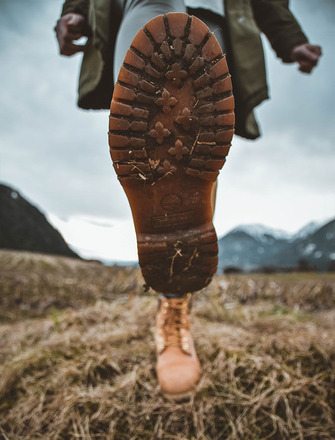
You can kick depression’s butt!
Whether you’re returning from teaching abroad in Spain or just wrapped up a year of study abroad in China , chances are things are going to feel different when you return home. Accepting your new reality is part of getting over post-abroad depression, but there are other things you can do to help make the transition a bit easier.
1. Learn about reverse culture shock
Pull out those study abroad materials or do some googling and read up on how to overcome reverse culture shock . It’ll still take some time to re-acclimate to your home country, but understanding that post-trip depression is normal can go a long way toward helping you get past it. Just like you got past your initial culture shock in your host country, you’ll also eventually hit your stride now that you’ve returned home.
2. Practice what you learned
Just because you’re no longer surrounded by Portuguese or Arabic on a daily basis doesn’t mean you can’t keep up your newfound skills! There are many ways to practice the language you learned while abroad, from reading local news online to watching movies in your target language. In bigger cities and college towns, there are conversation circles or cultural centers that host events where you can practice your language and get a soothing dose of your host culture, too.
3. Give back
Look for volunteer opportunities while you get your bearings in your home country. It’s a proven fact that helping others makes you feel good too, and getting involved in your local community will help you regain a sense of connection to the city and people you interact with on a daily basis. Who knows? Maybe you’ll enjoy it so much that you decide to take it on the road and volunteer abroad next!
4. Go explore your backyard
By now you should be a pro at discovering cool new places, right? After all, you probably spent your time abroad seeking out new neighborhoods, taking day trips to nearby cities, and learning all about what makes your host country special. Instead of lamenting the fact that you’re no longer abroad, do the same thing at home. Take a day trip to discover a new small town, go on a hike to someplace new, or find a cultural activity to participate in. There’s probably a lot that you’ve never thought to discover about your home country, so get started now!
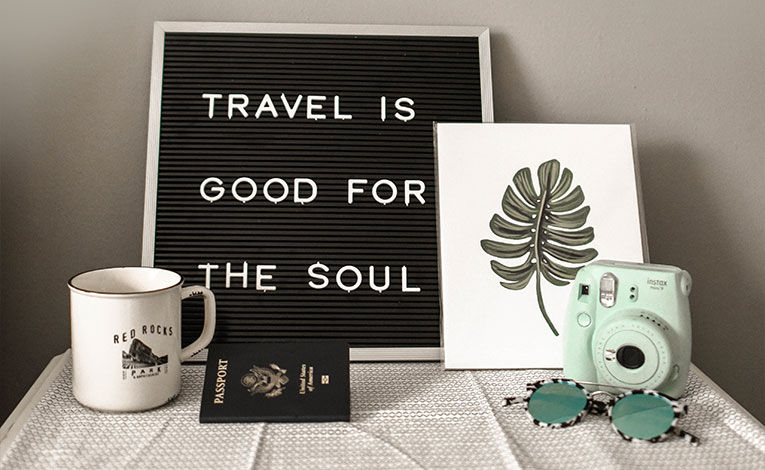
Encourage the explorer in yourself!
5. Connect with others
One of the best ways to get over post abroad depression is to be around other people. Isolating yourself can amplify your post travel blues, so get out there and reconnect with your old friends. Check out a new restaurant that’s opened since you were away, go for a walk, or participate in a shared hobby. If most of your friends have moved away since you were abroad, find new ones! Look for community events, meetups, or cultural activities where you can find people who share your interests.
6. Plan another trip
One fail-proof way to get over depression after trips is to plan another trip. Whether you have the time and funds to take a two-week break on a sandy beach somewhere or you can only swing a weekend in the next state over, planning for some time away allows you to take a quick break physically and mentally. While not all problems can be solved by a road trip or hopping on an airplane, sometimes getting away can give you some much-needed perspective on your current situation. If money is an issue, check out short-term volunteering trips that are affordable and let you give back to the community.
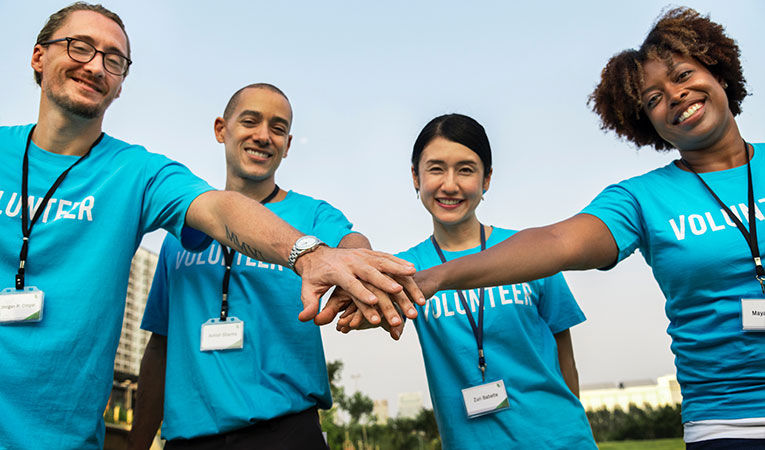
Plus, volunteering can make you feel all warm and fuzzy inside!
7. Try something new
Instead of constantly refreshing your browser hoping airfares to your host country have dropped, consider finding a new hobby. You probably got really good at getting out of your comfort zone and trying new things when you were abroad, so use those skills to get psyched about something in your home country. Learn how to make that pastry your host mom always made for you, join a community sports league, or find a volunteering gig. Not only will you momentarily be distracted from how much you miss being abroad, you’ll also add some new skills to your repertoire. You might even discover a lifelong passion!
8. Practice gratitude
It can be hard to feel grateful when you’re bummed and missing your host country, but take the time to practice gratitude for the experiences you’ve had. Not everyone is lucky enough to spend time living in a different culture, learning a new language, and making friends from around the world. Your time abroad was exciting and enlightening, but at times it was probably confusing and really dang hard, too. Be thankful for the life skills you learned while you were abroad.
Additional resources when you feel depression after a trip abroad
If you’ve tried the above suggestions and you still don’t feel any better, even after signing up for a knitting class, going on a camping trip, and getting dinner with friends, you may need to pull in some additional resources.
Talking about your post trip depression with a therapist or counselor can help you pinpoint why exactly you’re feeling down and find strategies to make things better. If you’re a student, you can access mental health resources through your school’s student counseling center. For those who aren’t in school, there are also ways to find therapists in your community .
During your time abroad, you learned a lot about yourself and how to be an independent, strong, and resilient individual. None of those skills have disappeared, and you can still use them to get through this tough phase in your life .
Don’t let post abroad depression get the best of you
Post-travel depression can affect anyone, and it’s important to recognize when the post travel blues might be something more serious. In many cases, those who return from time abroad are able to reintegrate into their lives within a matter of months, but sometimes it can take some dedicated work to feel normal again. Living abroad is an intense, challenging, and enlightening experience, and it’s bound to change you in more ways than you realize.
The good news is that this time spent abroad isn’t an ending, but rather the beginning of a new life of travel. Now that you’ve seen another part of the world, going out there and doing it again doesn’t feel as intimidating. It’s 100% possible to continue living an inspired life after spending time abroad , and chances are, the best is still yet to come.
Leave a Review of Your Travel Program & Help Future Travelers
Look for the Perfect Program Abroad Now
Related Articles

By Elizabeth Gorga | July 30, 2024

By Jhasmine Wade | July 27, 2024
Popular Searches
Study abroad programs in italy, study abroad programs in spain, marine biology study abroad programs, study psychology abroad, fall study abroad 2024, spring study abroad programs, recommended programs.

2582 reviews
International TEFL Academy

1695 reviews
International Volunteer HQ [IVHQ]

2064 reviews
MAXIMO NIVEL

660 reviews
Intern Abroad HQ
For Travelers
Travel resources, for partners.

© Copyright 1998 - 2024 GoAbroad.com ®
- Study Abroad
- Volunteer Abroad
- Intern Abroad
- Teach Abroad
- TEFL Courses
- Degrees Abroad
- High School Abroad
- Language Schools
- Adventure Travel
- Jobs Abroad
- Online Study Abroad
- Online Volunteer Programs
- Online Internships
- Online Language Courses
- Online Teaching Jobs
- Online Jobs
- Online TEFL Courses
- Online Degree Programs
How to Beat Your Post-Travel Depression: Your Guide to Feeling Better
Going from exploring new places every day to feeling like you're chained to a desk can make you feel very low. It's one thing, though, to reminisce over your vacation for the first few days you're back home. It's another, if you get the post-travel blues .
The what? I'm not talking about the usual dread of heading back to work after a long holiday, that feeling usually goes away quickly. I'm referring to a deeper kind of sadness, one that leaves you frustrated, demotivated, and even makes you question your life choices.
No matter how hard you try to slip back into your routine or focus on the day-to-day, your mind keeps taking you back to the trip you just experienced, or imagining your next adventure.
If this sounds familiar, you might be experiencing what is known as post-travel depression. And yes, post-travel depression is a thing. It's actually a state that affects many of us when we return home after a trip.
It happens to me, too. So, the good news is: you're not alone in this. In this article, I’ll explain what post-travel depression is , help you understand if you're experiencing it by laying out the symptoms to watch out for and give you some tried-and-tested tips on how to overcome it. Ready? Let's dive in.
What is post-travel depression?
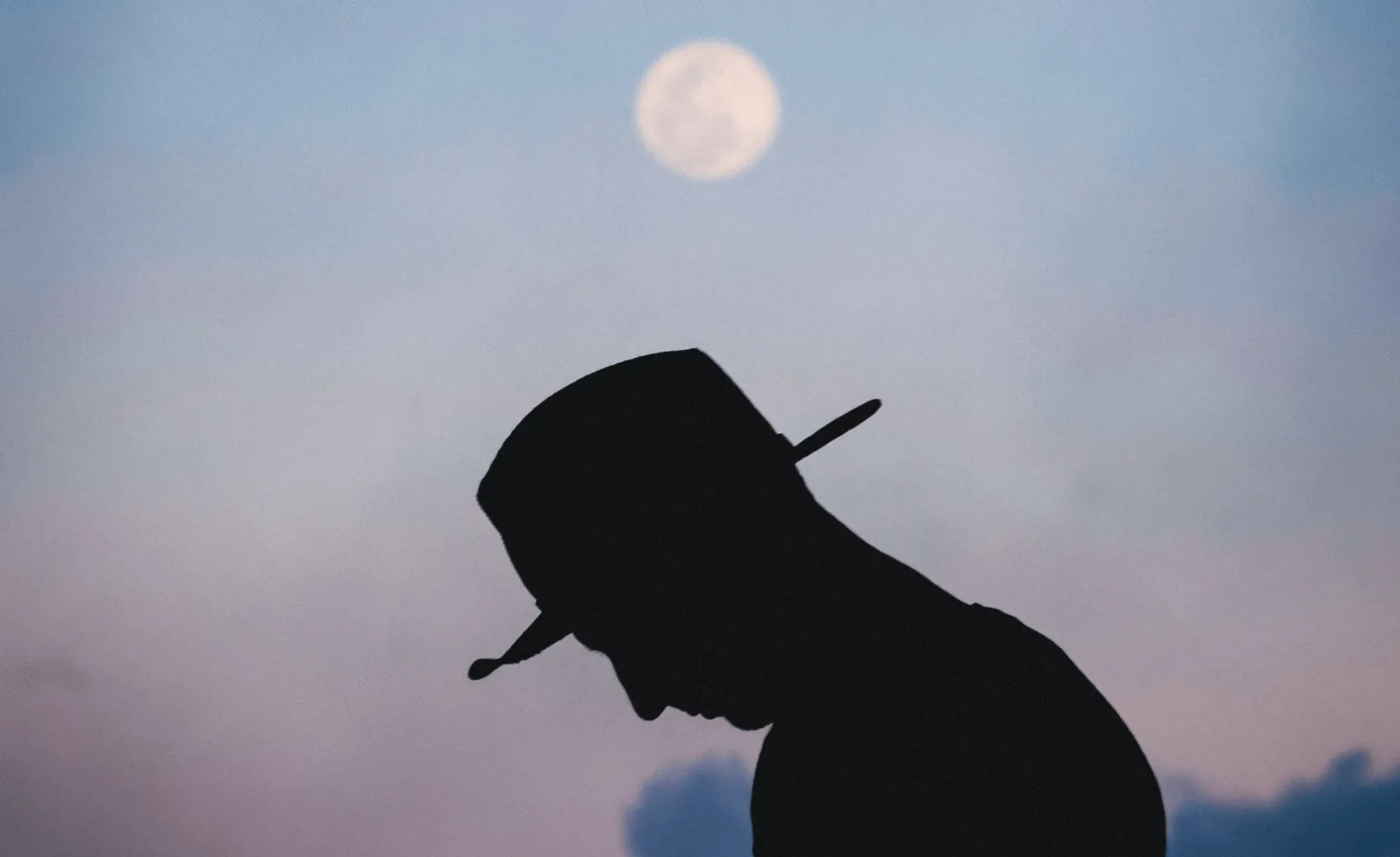
Post-travel depression (PTD), aka post-travel blues, is a common mood dip that people experience after returning home from a trip. This type of depression isn't typically a clinical disorder , but it can involve feelings of sadness, anxiety, and disorientation as you transition back to everyday life from the slower pace of vacation.
When people come back to their usual routines after a break, it can feel emotionally challenging. The loss of freedom and spontaneity that often comes with traveling can make regular life seem overly structured or limited.
More often than not, there’s a mix of nostalgia coming from the experiences and life you were living abroad, and a lot of stress from having to settle back into the daily grind.
But the good news is, that, unlike clinical depression , this condition is temporary and it can usually be managed. The best way to get out of it is to find ways to integrate the positive aspects of travel into everyday life, like planning future trips, or going after new experiences that can give you similar feelings of excitement.
What are the symptoms of post-travel depression?
Think of all the times you've returned from a trip and had a rollercoaster of emotions that went from the excitement of telling your friends and family about swimming with turtles for the first time, to the high anxiety levels of having to return to the office. I bet this happens to you all the time (ok, maybe not on trips that went south, but they're probably just a few).
If these emotions just last a few days, it's completely normal to have them, I mean... who doesn't prefer to enjoy the world rather than deal with your client's requests? But, if these feelings persist, don't underestimate them by thinking they're just in your head, they're not. You're most probably experiencing symptoms of post-travel depression.
But why? We're so used to living in either work mode (Monday - Friday, 9am - 5pm) or relax mode (weekends, holidays, vacation), that we think switching modes back and forth is a normal part of life. But we don't realize that shifting from relaxation mode (especially after a longer vacation) to work mode, can trigger a mix of emotions and physical symptoms that make us feel down. And no, ignoring these feelings won't make them go away, it can make things worse.
So, how can you tell if you're actually dealing with post-travel depression or just a phase of post-travel nostalgia? Here are some signs to watch for:
Mental symptoms
- Apathy and emotional numbness
- Difficulty concentrating, even on simple tasks
- Lack of initiative
- Restlessness
- Difficulties in making decisions
- High anxiety levels
- Mood swings
- Low motivation
- Persistent sadness
- Physical Symptoms
Physical symptoms
- Muscle tension
- Unexplained fatigue
- Sleep disturbances, including insomnia
- Poor digestion
What are the causes of post-travel depression?
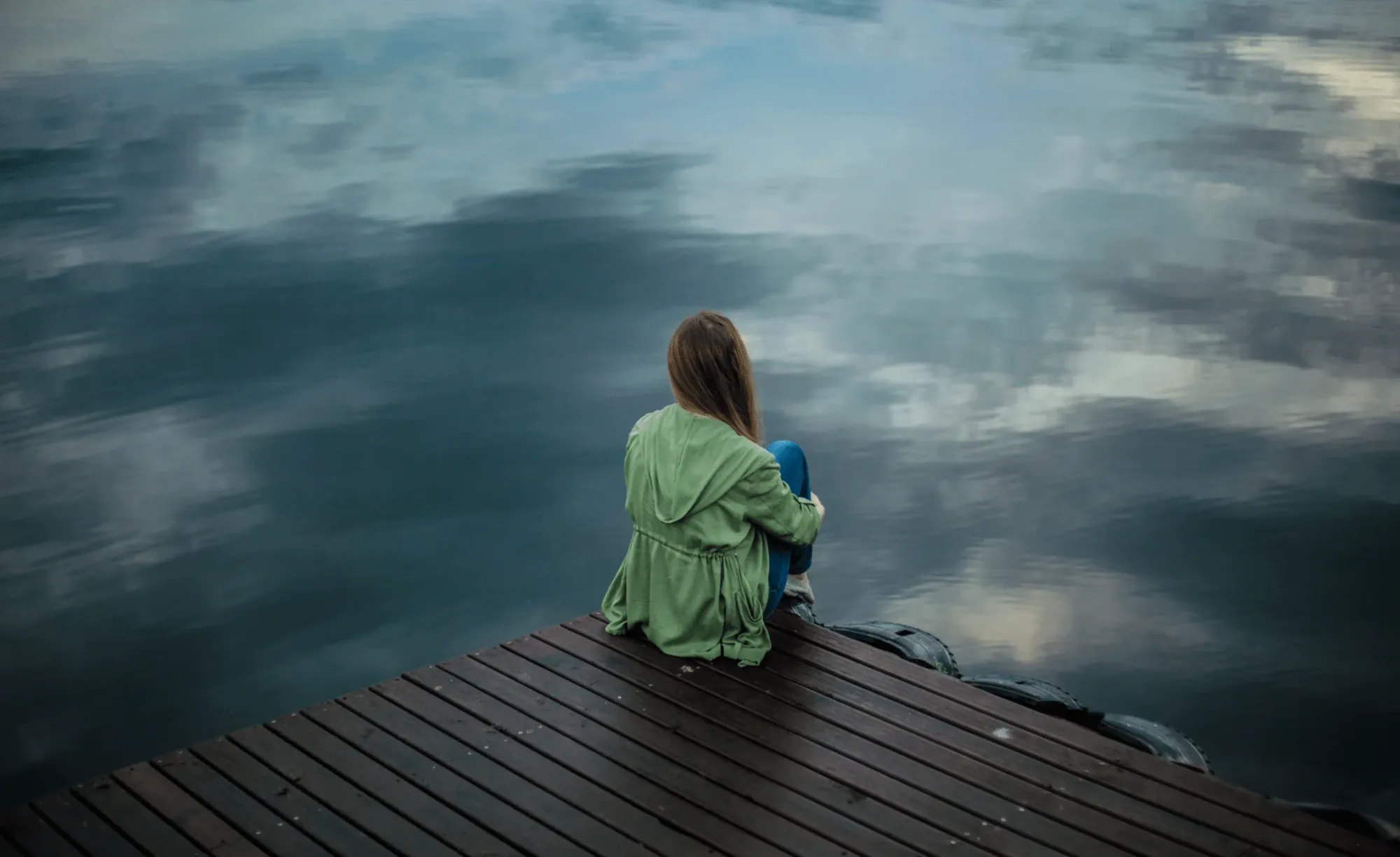
There are a bunch of factors that cause post-travel depression. These include physical symptoms like the impact of jet lag (you wouldn't believe how much having to re-regulate your sleep cycle can affect your mood), but most importantly, mental symptoms that are more often than not linked to how happy you are in your life back home.
According to Medical News Today , slipping back into an old routine —maybe one you're not in love with, to begin with—is a common trigger for post-travel depression.
And it makes sense. Society has been telling us to grind, make a living for ourselves, succeed no matter what. Up until a few years ago, the word "work-life balance" was considered a joke. But here's a reality check: we don't all have our dream job, or a sweet boss, or love the city we live in, or have the coolest friends. Maybe we don't love the reality and routine we have at home.
But when we travel, we have a second shot at creating the experience we want. We have the energy and desire to meet new people, have fun, try out a new sport we'd never do back home, and even learn to cook stuff. So much so that traveling has become the highlight in many people’s lives.
And even if you love your life back home, the tasks, responsibilities, and hectic pace that await you when you return are usually a source of stress. If you're in this box, the good news is you're probably going to experience the post-travel blues for a few days, then feel fine.
But for those of you who only feel alive when you're traveling, the gap between who you are during your travels and who you are at home can become so big that stress and depression hit hard. This can make readjusting to everyday life not just a challenge, but a severe emotional struggle.
How to manage post-travel depression
Now that I've discussed what post-travel depression is and what usually triggers it, let's focus on how to handle it and move past these symptoms.
I'll share 7 practical tips to help you deal with post-travel depression. Take notes and see which of these might work best for you.
1. Plan your return trip thoughtfully
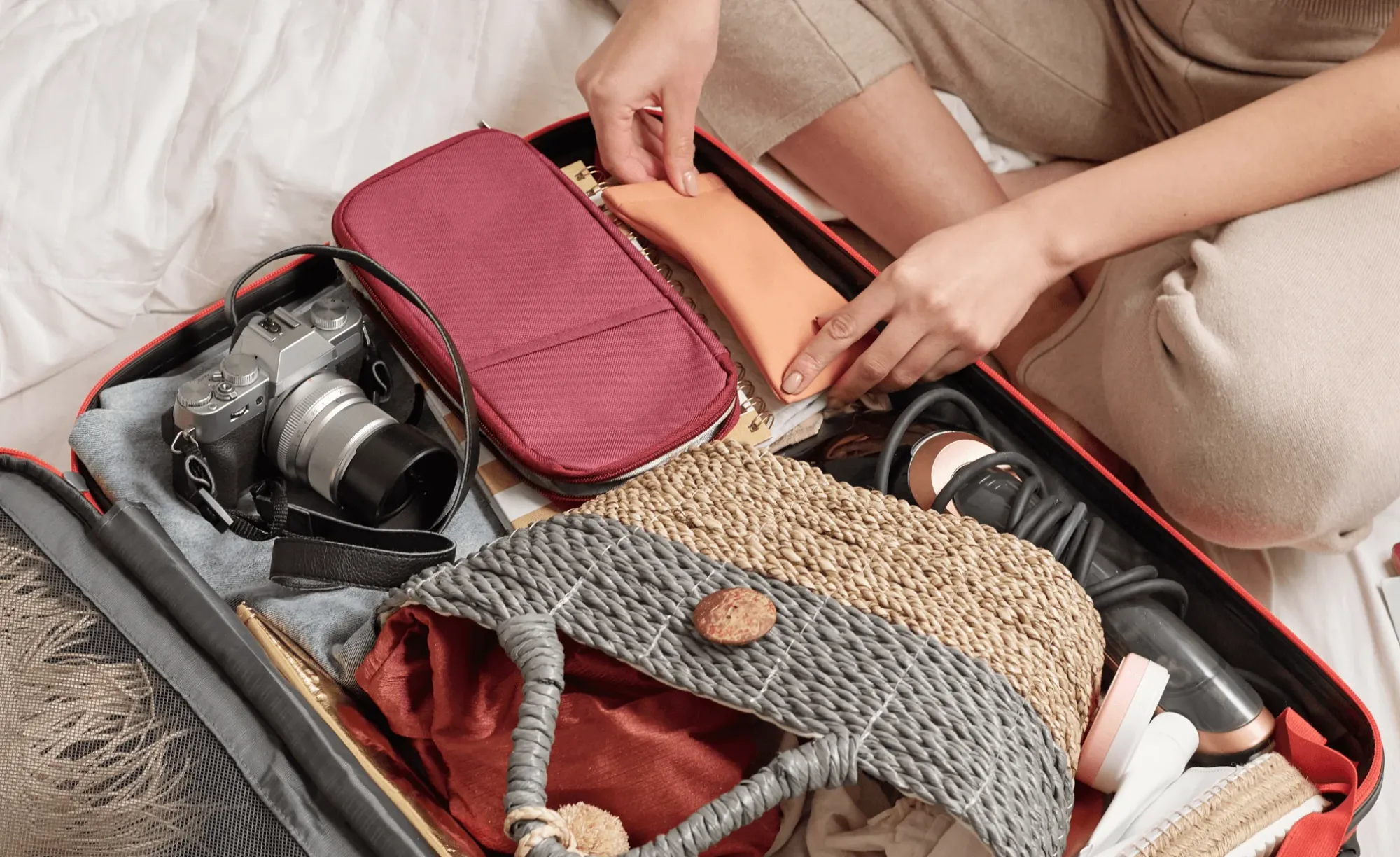
This tip is all about preventing that mess and stress you often feel when you get back home.
When you're traveling, you don't want to feel rushed. So why would you want to feel rushed when you're packing before boarding on your return flight? All that rush to make it in time to the airport, with the constant worry if you forgot something in your accommodation can seriously ruin all the relaxation you accumulated up until that point.
Instead of just throwing all your clothes in your luggage, take your time to plan your trip and pack without feeling rushed. This approach turns packing into a calming ritual that keeps the chaos at bay, not just when you're unpacking but also as you start thinking about heading home. Plus, it helps you ease back into your everyday life without feeling like you've been thrown back into it all of a sudden.
2. Plan to return home a few days early
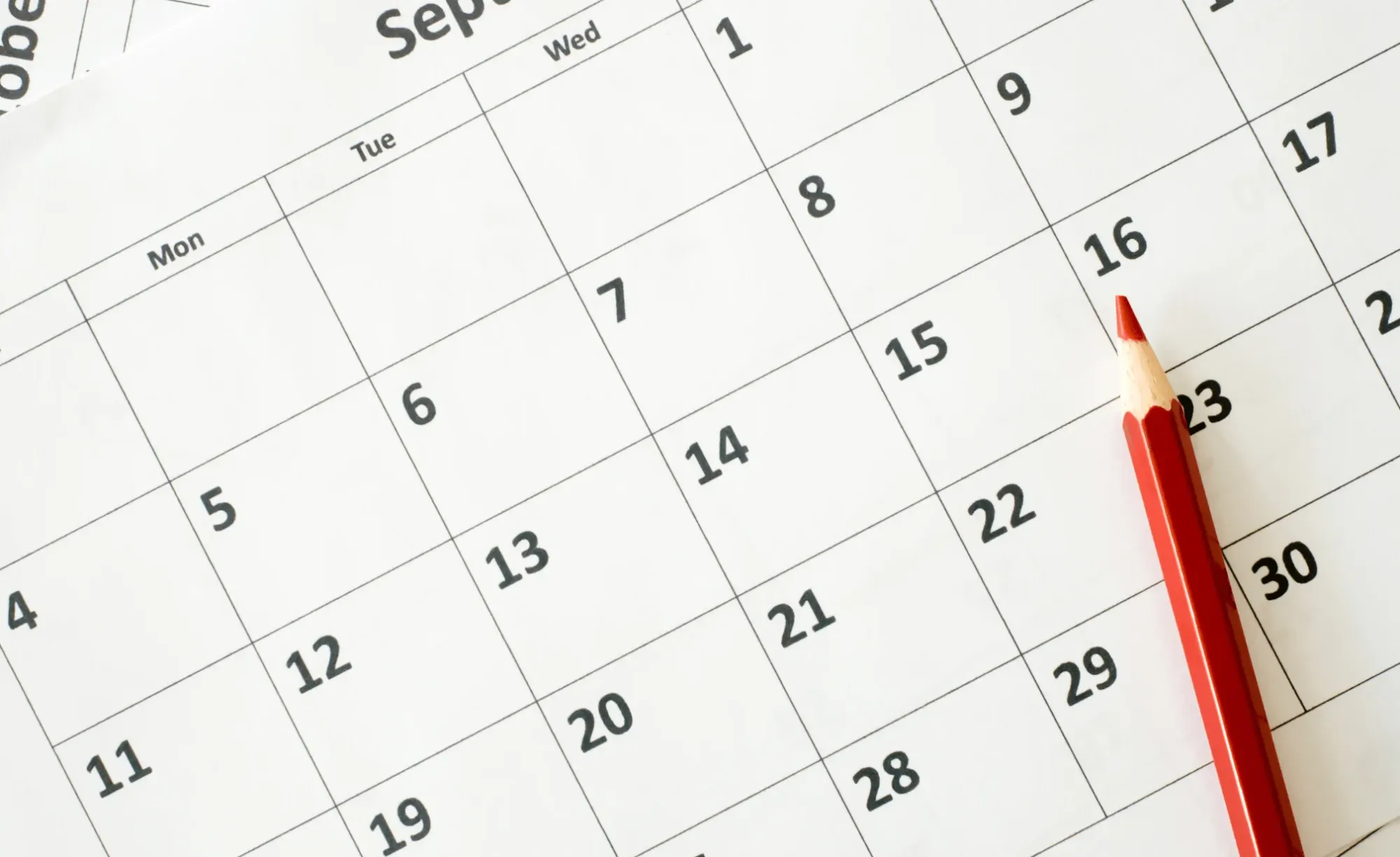
Yes, vacation time is precious, and it might seem hard to give up even a single day. But trust me, if you want to make your transition smooth and avoid feeling those post-travel blues, it's a must your return a few days early.
I have a friend who always plans his return flights a few days before the weekend, that way he has the whole weekend plus one or two days to readjust and get his mind and body ready to switch back from relax mode to work mode. Trust me, you don't want to go from spotting lions on a safari to replying to those "out of office" emails the day after you return from your trip.
Giving yourself some days to unwind after you return will give you some extra time to organize your routine without the added stress. Not to mention, it allows you to ground yourself again.
3. Stay active
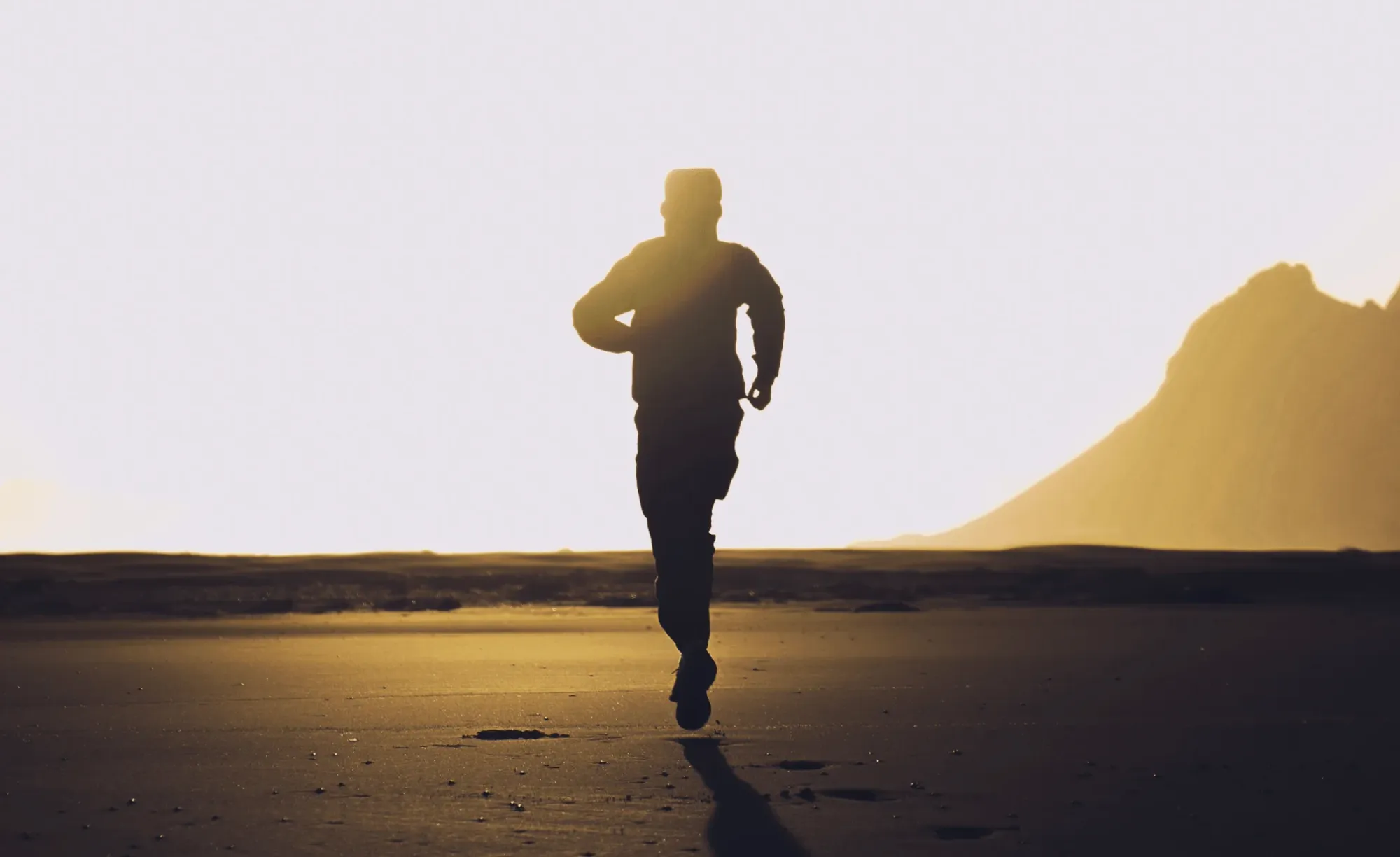
I bet you probably spent your travels exploring new places, hiking in beautiful areas, getting your dose of vitamin sea in some tropical destination. Now, I'm pretty sure the Monday right after you return from your travels will most likely be you sitting in front of a desk for countless hours.
We don't need an expert to tell us the routine you had while traveling was healthier for your body than the one you probably have at home. That's why it's essential for you to keep moving and stay active once you're back. Even if you're a couch potato, get up and start moving! Harvard Medical School reported that a recent study found that " Running for 15 minutes a day or walking for an hour reduces the risk of major depression." So, the third trick to beat post-travel depression is easy: get up and move.
4. Pay attention to your diet

Have you seen the Netflix docu-series "You Are What You Eat?" Me either. But I don't need to watch it to tell you the title nails my next piece of advice.
If you've spent the last few weeks traveling the world, chances are your diet was better than the one you're used to at home. The Standard American Diet — aka SAD (I know, the acronym says it all) — lacks the right amounts of fresh fruits, vegetables, whole grains, lean proteins, and healthy oils other diets are known for. Instead, it's excessively high in red meat, high-fat dairy products, processed and fast foods, added sugars, etc.
But even if you think your body is craving a burger, trust me, especially if you're feeling low, it's best to go for fresh, plant-based foods, like berries—which are good sources of antioxidants. Because believe it or not, eating balanced meals can boost your mood, help you sleep better, and shake off some of those stress-related symptoms of post-travel depression .
5. Keep traveling
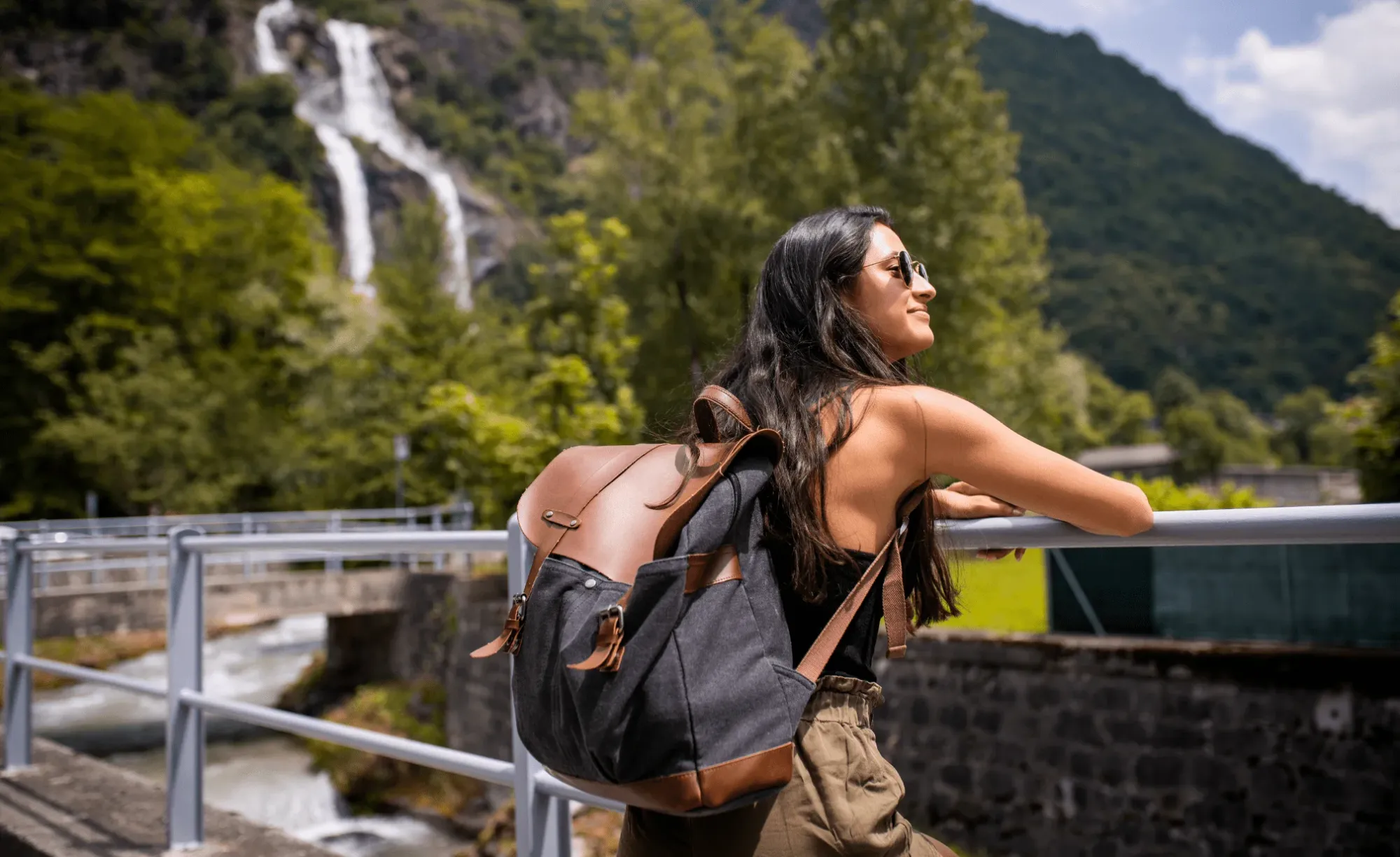
Just because you're back from a trip doesn't mean you have to plunge straight into work and responsibilities. Think of it this way: one adventure has just ended, and now you've got the chance to start planning the next one.
If you're constantly thinking about traveling, why not begin planning out your next trip, weekend getaway or even day trip to explore some local spots you've never been to before ? I'm pretty sure there's a hidden gem just around the corner that could be perfect for next weekend. Keep that traveler’s spirit alive!
If instead you want to pamper yourself, maybe look up a day spa in your area or a laid-back spa package.
You may also be interested in:

6. Ease back into your routine
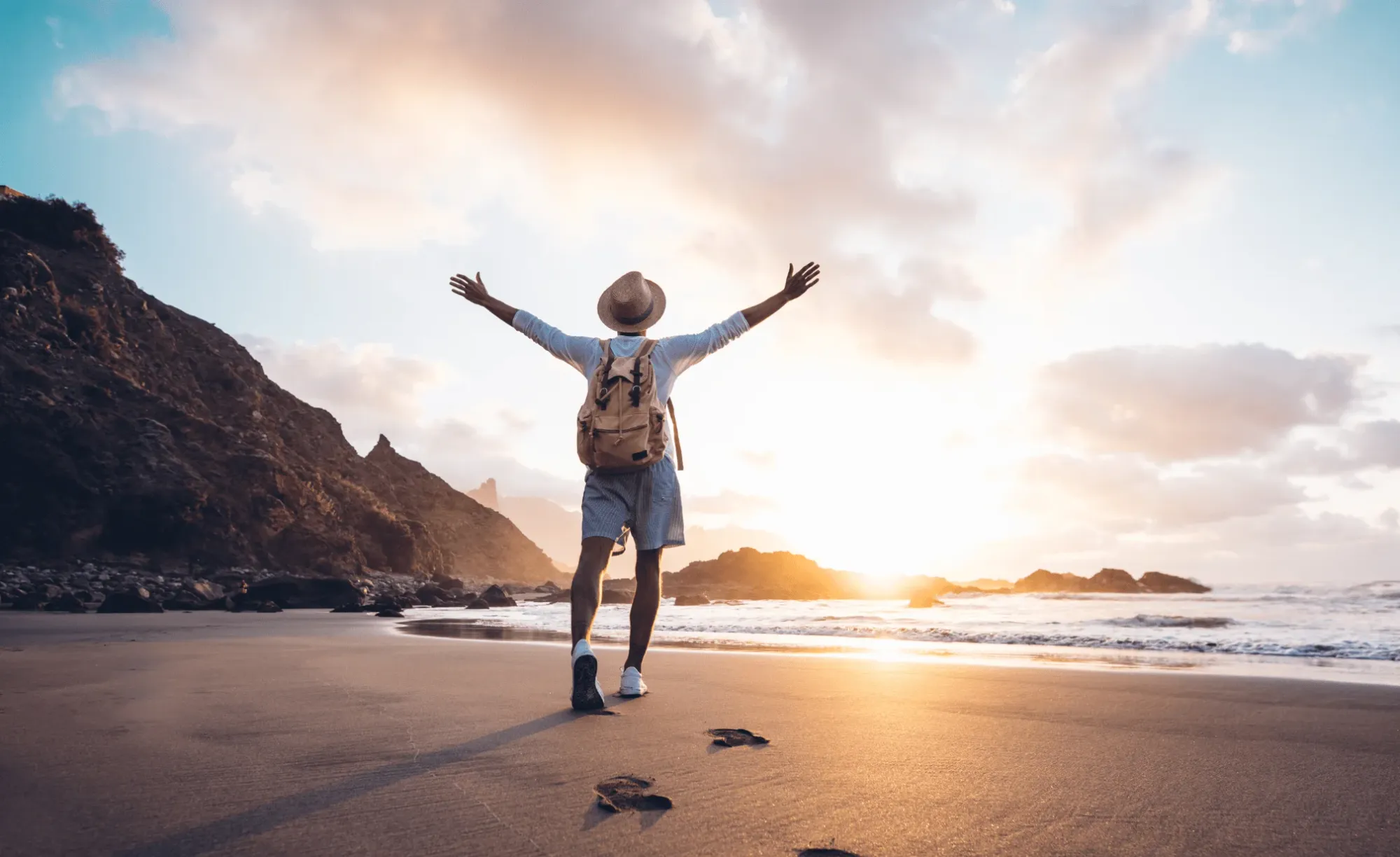
This one goes hand-in-hand with planning your return a few days early. Again, you may not think going from exploring to working could have any effect on your mood, but it definitely does.
Instead of going through a checklist of to-dos as soon as you get back, ease back into your daily routine. Take your time and allow yourself some moments to just breathe and detach. You're human, after all. If you have loads of things to do, instead of freaking out about the amount of workload that's waiting for you, set some small, realistic goals for the coming days and weeks to make your transition smoother.
7. Spend time with people who matter
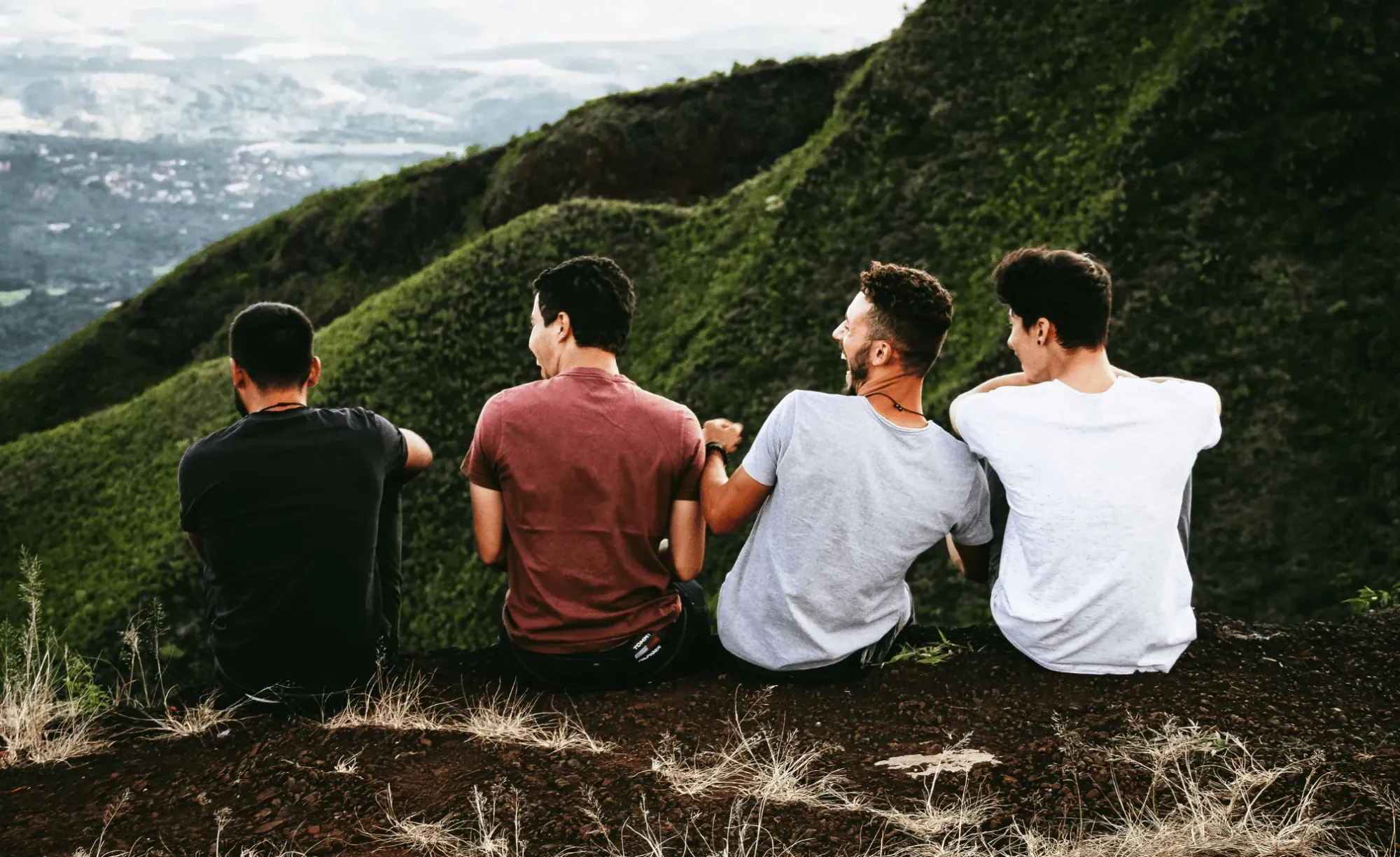
Skip posting everything on your Instagram stories and instead meet up with your friends and family to tell each other about the adventures you had while traveling. Remember your swimming with turtles for the first time experience? Share it with them! Reach out to the people that matter in your life and plan a day out, hang out, or just grab dinner and some drinks together.
Remember, if you're experiencing any of the post-travel depression symptoms I mentioned before, the last thing you should do is isolate yourself! I know that keeping to yourself might be what you think you want but being alone won’t do any favors for your mood.
I’ve tried to soldier through on my own before, and it just made things worse. Trust me, being around people who care about you can really lift your spirit.
Wrapping up
So here they are, the seven tips that can really help with post-travel depression. If you're experiencing post-travel depression right now, don't worry, we've all been there. As in everything, learning how to deal with these emotions comes with experience. But there’s one more thing I want to talk to you about, something a bit more serious .
If you've been feeling really low for a while now, noticing that these tips aren’t helping much, and you’re stuck in a phase of sadness or depression, it might be a good idea to talk to someone about it .
I know, it's tough to admit sometimes, but feeling down after returning from a trip isn’t unusual, and it’s definitely not something to feel embarrassed about. I’ve been there, and I know many others have too. That’s actually why I wrote this article—I wanted to give some tips that can help you make your transition back home less stressful.
But if you’re really struggling and can’t seem to shake it off, please think about getting some professional help . Taking care of your mental health is super important remember, with the right approach, it’s completely possible to easily bounce back from post-travel depression.
Ready to beat the post-travel blues?
If you want more digital nomad guides like these, sign up for our free newsletter and get upcoming articles straight to your inbox!

Sign up for our Newsletter
Receive nomad stories, tips, news, and resources every week!
100% free. No spam. Unsubscribe anytime.
You can also follow us on Instagram and join our Facebook Group if you want to get in touch with other members of our growing digital nomad community!
We'll see you there, Freaking Nomads!
Disclosure: Hey, just a heads up that some of the links in this article are affiliate links. This means that, if you buy through our links, we may earn a small commission that helps us create helpful content for the community. We only recommend products if we think they will add value, so thanks for supporting us!
Best International Health Insurance for Digital Nomads and Remote Workers
Heymondo review: is it a good travel insurance, wise travel debit card review: fees, exchange rates, limits and how to use it.
Post-vacation depression is common, a psychologist says. Here's how to beat the post-holiday blues.
- Dr. Daniel Glazer is a clinical psychologist.
- He says it's common for people to feel down after returning from vacation.
- He recommends people keep track of their memories and bring something home with them from the trip.

This as-told-to essay is based on a conversation with Daniel Glazer . The following has been edited for length and clarity.
You go on a great holiday — a hiking vacation with your partner or a cruise with the family. It's a wonderful time, but when you get back to the hustle of your normal day-to-day, you might find yourself feeling down. It's something I've seen time and again with my patients as a psychologist: spikes in anxiety and moodiness after time away.
We go on vacation to escape from the demands of reality. But when you come home and realize you've got to step back into that life you wanted to get away from, there's tension.
Sometimes, there's a deeper reason for feeling down. At the beginning of vacation, we're full of excitement and anticipation. But by the end, it can feel like the good times gone by in the blink of an eye. Something precious, starting and ending, can bring up feelings about our own mortality and the fleeting nature of life.
All of this is no reason to skip your next vacation, however. Here are six ways to fight the post-vacation blues and make sure your time away ends on a positive note.
Keep track of your memories
Vacations are about unplugging, but they're also about creating new, positive memories. Whether it's simple moments, big thrills, or life-changing experiences, travel is full of memories. Keeping track of those is a great way to reflect on your vacation and realize just how much you got from your time away.
Related stories
There are a few ways to go about this. You can try scrapbooking — which has the added benefit of being a great way to unplug after you return home. Or, you can opt for the modern version by posting on social media — just make sure you're doing it for yourself, not for the dopamine hit of all those likes.
Journaling or writing a letter about your experience can also help you foster gratitude for everything you experienced during your time off.
Learn a new skill and bring it home with you
Lifelong learners who have a keen sense of curiosity are more confident, resilient, and able to cope with stress. You can foster these benefits by trying something new on vacation and then bringing that experience home with you.
Maybe you continue to cook a favorite dish you ate in Europe or sneak in phrases of a language you picked up before you departed. These actions keep your sense of adventure alive and give you a level of playfulness even when you're back to work.
Spend time with friends and family
Vacations can be times of intense bonding, whether you're traveling with your family members or bonding with strangers on a group tour. Human interaction releases lots of feel-good neurotransmitters. But when we get home and no longer have an intense connection, we can feel lonely.
To avoid that, arrange to spend time with friends and family when you get back from your holiday. You can catch up with them and tell them about your travels, which has the dual benefit of encouraging gratitude while also creating connections with others.
Follow healthy habits
On vacation, you might tend to eat lots of treats, drink a bit too much, and stay up late. When you return home, getting back into your routine can be difficult, especially if you're battling jet lag.
Switch your cocktails for mocktails, start following a good sleep hygiene routine, and make sure you're getting plenty of exercise. Spending time in nature can help reset your circadian rhythms when they've been thrown off by jet lag, and it will also help boost your mood.
Expect some anxiety
We often think of anxiety as a problem that needs to be fixed as soon as possible. But really, anxiety is a normal part of being human. It's ok to expect some mood changes when you get back from vacation.
Know when you need to make bigger changes
If your symptoms start interfering with your day-to-day schedule, or you really dread returning to your job and other obligations, take some time to examine why — a qualified therapist can help with this. If you're very uncomfortable, it can be a sign that some things in your life—like your job, hobbies, or the amount of time you have to yourself — need to change.
Watch: NYU professor says Facebook should pay taxes for making us less productive
- Main content
- Travel Guide
Tips to overcome Post-Travel Blues
If you have ever experienced feeling down after coming back from travelling, you are not alone - this phenomenon is the so-called post-travel blues. Through research by scientists, there is now an officially recognised name for it: Post-vacation syndrome (PVS).
What are post-travel blues?
Post-vacation-syndrome – also called post-travel blues or post-holiday depression – is when one experiences feelings of depression and/or anxiety after a vacation. It can also manifest as irritability, listlessness, difficulty concentrating, and sleep issues, i.e., insomnia or sleeping too much. In the past, most research focused on depression occurring during holidays. However, there has been an upsurge in post-holiday depression in recent decades. Consequently, scientists have begun to devote more attention to it. In 2015, a National Alliance on Mental Illness survey found that 64% of participants had experienced post-holiday blues.
What causes post-travel blues?
Mental health professionals believe several factors can trigger post-travel blues. However, most experts think transitioning from a holiday to everyday life can cause an adrenaline crash that accounts for the syndrome. There are two sides to this coin. On the one hand, some people find travels or the holidays highly stressful. Financial pressure, family friction, and reminders of lost loved ones can create emotional distress. Furthermore, the holidays tend to be a time of sheer abandon in health terms. Psychological stressors, rich food, alcohol consumption, late nights, and busy days can leave one feeling drained after a vacation.
However, travellers returning from a life-changing trip away may experience post-holiday depression for a different psychological reason. They may share the overindulgence factor with people who struggle with stressful vacations. However, unlike people who become emotionally overwhelmed during holidays, these individuals miss the exhilaration and adventure of the experience. One interviewed traveller said, 'When you travel, you grow fast. You learn so much about yourself and other people and cultures. Once you see different parts of the world, you are never the same again. But then you come home and everything and everyone around you is exactly like when you left. You feel this sense of emptiness you can't explain… It's a reverse culture shock'.
Whether you love or hate holidays, returning to everyday life after time away can cause adrenaline to dip significantly. The brain struggles to calibrate after experiencing such dramatically different cultures and environments. This causes the physical and psychological symptoms collectively recognised as a post-vacation syndrome.
How long does post-travel depression last?
Typically, post-travel blues do not last as long as other depressive states, but the syndrome's length differs between people. Some still experience PVS for months after their holiday. Others find their symptoms so debilitating that they interfere with their work and/or social life. If your post-holiday blues persist for a long time or are unmanageable, contact a mental healthcare professional, organisation, or helpline for advice. They are there to assist!
How to deal with post-travel blues
Fortunately, there are ways to get over post-travel blues or even avoid them altogether. Experts suggest these tips to combat the syndrome.
Before the trip
1) Book realistic return dates: Plan your return as carefully as you do your travels. Understandably, most people want to cram as many travel days into their leave allocation as possible. However, to avoid post-holiday depression, factoring in a couple of days to decompress can be enormously helpful. Avoid flying in on the Sunday night before the Monday you return to work. Instead, book your return date a few days earlier. This stop-gap will give you time to readjust before diving back into work and other commitments.
2) Schedule catch-up time: You can also minimise post-travel depression by using these extra leave days to catch up on work. This may include checking your emails, mulling over problems that may have cropped up, or preparing discussion notes.
3) Manage your expectations: Prepare yourself to be plunged into a different reality for a while, and acknowledge that this may shake you up emotionally and physically. Be aware of your psychological triggers, whether they may be fear of a foreign environment or an abrasive relative. Furthermore, figure out how you would best like to react to such uncomfortable situations ahead of time. Speak to a friend, family member, or mental health professional and map out a game plan for these potential pitfalls.
4) Create an inviting space for your return: Getting back to a mountain of laundry or a sink full of dirty dishes after a holiday can exacerbate post-holiday syndrome. It is naturally tempting to let household chores slide when you are rushing to make final holiday preparations. Nevertheless, remember that getting back to a clean, comfortable space is infinitely preferable!
5) Plan fun things to do when you arrive home: Think of what you would most like to do when you get back from holiday and plan accordingly. For example, put list of favourite movies to watch, or organise a catch-up with your loved ones. Whatever you choose to do, having some plans in place upon your return can help ease feelings of post-travel blues.
During the trip
1) Stay off social media: Jennifer Wallace is the author of the Glamour Magazine article entitled The Holiday is Over...Sob. What Now? She advises travellers to keep off social media while they are on vacation. ‘This helps you stay in the moment and relish every beautiful moment of your adventure without being distracted’, she explains.
2) Follow the 95% rule: A great tip to avoid stress after your holiday is to devote 5% of your time to work. Check your emails every day or two for any work 'fires' starting. However, applying this rule can be a delicate balance. Addressing problems early is a great way to avoid work issues snowballing. Nevertheless, it is critical to refer concerns to your team on the ground and trust them to address these. If you try to sort them out while away, you have virtually no chance of sticking to the 95% rule.
After the trip
1) Avoid procrastination: It can be tough to kick back into action when you arrive home. When basking in that post-vacation glow, Monday morning can seem far away, particularly if you return a few days early. However, putting things off is the worst thing you can do for your re-entry to reality. Remember why you put those scheduled catch-up times in place and stick to them!
2) Put time aside for people who feed your soul: Make time to reconnect with friends, family, and loved ones at home. You may not be able to communicate fully how mind-altering your journey has been. However, it will help those at home to understand your post-travel depression or elation, whichever side of the spectrum you fall on. And you may even find your revelations make them catch the travel bug too.
3) Bring travel rituals home: Holidays and traveling provide a wonderful opportunity to step back, reconnect with your passions, and rediscover what you truly love to do. They are also a chance to experience new things that make you feel happy and alive. It is easy to lose those treasures when you return to daily routines and commitments. However, you can also take them back home with you by setting aside time to do whatever fed your soul while away. Read, practise yoga, cook your favourite holiday dish, take a sunset stroll – or do whatever else you most enjoyed on your travel experiences.
4) Get active: An extensive body of research shows that exercise has significant mental and physical health benefits. These include raising the body’s endorphin levels – the body’s ‘feel-good neurotransmitters’. Therefore, exercise can be an excellent antidote to stress, depression, and anxiety, including post-travel blues. You do not need to spend hours working out or doing high-impact exercise for it to make a difference. Even a 15-minute walk can help to shift your mood.
Why we need holidays
'Holidays are a medical necessity!', says Wallace. Research shows that vacations do more good than harm for most people. The Framingham Heart Study found that taking regular holidays lowers the risk of heart attacks by 32% in men and 50% in women. So take that time off, guilt-free! Just be sure to arm yourself with the knowledge and tools to diffuse potential PVS should you need them. Additionally, remember that this syndrome usually passes relatively quickly - but unforgettable travel memories last forever.
Subscribe to our newsletter
By confirming the "Subscribe now" button, I hereby bindingly subscribe to the Natucate newsletter, which contains comprehensive information in the field of sustainable travel. For information: Detailed information regarding the performance measurement included in this consent, the use of the dispatch service provider Mailchimp, the logging of the registration process and your revocation rights can be found in the privacy policy.
11 Ways to Beat Your Post-Travel Depression
:max_bytes(150000):strip_icc():format(webp)/10626503_775084875863647_1149782182633260913_n-56a90ed43df78cf772a33c01.jpg)
It's the moment practically everyone dreads: the end of an amazing trip. Returning home, whether from a two-week-long vacation or a multi-year round-the-world trip, can hit you hard, and this post-travel depression can affect everyone. Sometimes it can even begin in the days running up to the end—you always end up feeling a little sad in the days before heading home. As well as a sense of depression, other symptoms you may experience include lethargy, loss of appetite, a lack of motivation, feelings of nostalgia, and—a great way to cope —immediately researching your next trip.
In all seriousness, though, post-travel depression can seriously affect your mental well-being and last for as long as weeks or months. One huge reason why this is the case is that travel is transformative . After you've explored the world, you'll feel like a different person, but everyone you return to can be the same.
So, what can you do to prepare yourself for post-travel depression, and how can you minimize its effects? These helpful tips will help you get back on track and prepare for another journey.
Keep Busy During the Final Days of Your Travels
© Marco Bottigelli / Getty Images
The last thing you want is for the end of your trip to be overshadowed by a sense of sadness about it coming to an end. To overcome this, make the final few days of your vacation the busiest of the entire trip. This means booking yourself in for classes, taking tours, going shopping for souvenirs, and taking long walks. It helps to keep your mind off the fact that you'll be returning home soon and keeps you enjoying the place you're currently in.
If Possible, Don't Return to Working or Studying Immediately
Klaus Vedfelt / Getty Images
Nothing makes you feel like you've returned to reality with a bang than returning home and immediately throwing yourself back into your old routine. This won't be possible for everyone, but if you're one of the lucky ones, aim to give yourself a few days to transition back into everyday life when you return. If you can't take extra time off, it might be worth arranging to end your trip on a Friday so that you can have the weekend to yourself.
This time will allow you to overcome your jet lag , unpack and do your washing, catch up with friends, or even sort through your memories. Take your time decompressing and the depression won't hit you as hard.
Catch Up With Friends
SolStock / Getty Images
Let's face it: listening to other peoples' vacation stories can be pretty boring, so talking to friends about your trip for any real length of time can be a challenge. When you're battling the post-travel blues, though, this can be a blessing in disguise. Meet up with a friend and chat about what you've been up to in your time apart. Sure, you'll get to share stories from your travels, but you'll also hear about the fun things they've been up to while you've been gone. This will help keep you distracted and lessen your attention on how you wish you were still abroad.
Attempt to Maintain the Mindset of a Traveller
Hinterhaus Productions / Getty Images
When you travel, you'll often find yourself with a different mindset. On the road, you may be all about trying new things, signing up for fun experiences, and eating as much good food as possible. But when you live somewhere, you tend to eat at home, fall into a routine, and rarely sign up to try anything new. This lifestyle definitely doesn't help to boost one's mood.
Keep the buzz of excitement that comes with travel alive by maintaining the mindset of a traveler. Take a cooking class in your hometown, continue with surf lessons, take a dance class or two, and treat yourself to a nice meal every couple of weeks or so.
Travel in Your Backyard
J.C. Leacock / Getty Images
Who says that travel has to end when you return home? After returning home, plan to explore where you live as if you were a tourist. Take a walking tour, jump on a tour bus, take a cooking class, visit the most famous monuments, and take tons of photos. You could even plan a museum-hopping day to learn more about the history of your hometown.
After traveling and returning home with this mindset, you might find that your hometown is a fascinating place to visit.
Share Your Photos With Friends
Teera Konakan / Getty Images
Relive your vacation by sharing your photos with friends on Facebook and Instagram. It'll make you feel as though you're being productive and cheer you up as you look back on your happy memories. Be careful with your privacy settings if you're not comfortable with sharing your vacation with the entire world, though.
Re-Read Your Travel Diary or Travel Blog
Westend61 / Getty Images
Many love to keep a record of those life-changing moments during their travels. If you decided to keep a travel diary or blog throughout your trip, spend some time reliving the best experiences and looking back on what you learned when you return home.
If you didn't want your writing to take away from your trip, now could be a good time to start a blog. You can reminisce about the best parts of your journey, share your thoughts and feelings about coming home with your friends or anyone else who stumbles upon it and use it as an opportunity to go through and edit your photos.
Find a Place for Your Souvenirs
David Cleveland / Getty Images
If you purchased souvenirs on your trip, spend time organizing them and working out where to place them. It'll help fill your home with happy memories and inspire you to keep seeing the world.
Start Planning Your Next Trip
JGI/Jamie Grill / Getty Images
One of the best ways to take your mind off the post-vacation blues is by planning your next trip. Start by sitting down and coming up with a list of everywhere you dream of visiting. Next, start coming up with a plan for how you can make it become a reality. With a new focus in your life, you'll have something to keep your mind off of your previous trip.
Start Taking Care of Yourself
Luis Alvarez / Getty Images
When we travel, it can be hard to take proper care of ourselves. Maybe you ate out for every meal and are feeling unsettled from all that rich food; maybe you spent two weeks lying by the pool while letting your exercise routine fall apart, or maybe you spent every night drinking and dancing and are desperately craving a good night's sleep.
Travel isn't always great for us, so take your return home as an opportunity to start caring for yourself. Decide to eat healthily for a while, join a gym, run, head to a spa, or get an early night. Taking good care of yourself should help reduce your post-travel blues.
Help Out Other Travelers
Tony Anderson / Getty Images
While traveling, you likely ended up relying on the kindness of strangers at multiple points throughout your trip. Whether it was a friendly local who helped send you in the right direction when you were lost or someone at the hostel reception who gave you a fantastic restaurant recommendation, you were probably grateful multiple times for the help others gave you.
Aim to pay it forward after you return home by helping out tourists who are lost in the place you live. If you see someone staring at a map on their phone and looking confused, ask if you can help them. Suppose somebody makes eye contact with you—smile and ask how they're doing. If someone looks obviously like a tourist, ask if you can do anything to help. You could even spend some time browsing some forums online to see if you can answer any strangers' queries about places you know well.
It'll keep you busy, help you get back into the routine of chatting to other travelers, and make you feel good about how you're helping others in their times of need.
3 Easy Ways to Avoid Restaurant Scams
Tips and Advice for Dealing With Homesickness
How to Avoid Taxi Scams
Why You Should Never Carry Packages for Anyone Else When You Fly
Odds of a Commercial Airplane Crashing
How To Recover A Lost Cell Phone While Traveling Abroad
What You Need to Know About Bear Safety
6 Ways to Keep Your Things Safe in Hostels
Three Mobile Apps You Need for Safe Travels
5 Dangerous Hotel Habits You Can Break Today
How to Use a Money Belt When Traveling
Whether to Use Cash, Credit, or Debit While Traveling
Train Travel Safety Tips
What to do if You Encounter a Bear in the Wilderness
How to Keep Your Money Safe While Traveling
How to Prepare For a Severe Weather Event
Need help? Call us at (833) 966-4233
- Anxiety therapy
- Cognitive behavioral therapy (CBT)
- Depression counseling
- Dialectical behavior therapy (DBT)
- Grief & loss counseling
- Relational therapy
- View all specialties & approaches
Thriveworks has earned 65+ awards (and counting) for our leading therapy and psychiatry services.
We’re in network with most major insurances – accepting 585+ insurance plans, covering 190 million people nationwide.
Thriveworks offers flexible and convenient therapy services, available both online and in-person nationwide, with psychiatry services accessible in select states.
Find the right provider for you, based on your specific needs and preferences, all online.
If you need assistance booking, we’ll be happy to help — our support team is available 7 days a week.
Discover more
Why am I so sad after a vacation? How to deal with post-vacation depression
Our clinical and medical experts , ranging from licensed therapists and counselors to psychiatric nurse practitioners, author our content, in partnership with our editorial team. In addition, we only use authoritative, trusted, and current sources. This ensures we provide valuable resources to our readers. Read our editorial policy for more information.
Thriveworks was established in 2008, with the ultimate goal of helping people live happy and successful lives. We are clinician-founded and clinician-led. In addition to providing exceptional clinical care and customer service, we accomplish our mission by offering important information about mental health and self-improvement.
We are dedicated to providing you with valuable resources that educate and empower you to live better. First, our content is authored by the experts — our editorial team co-writes our content with mental health professionals at Thriveworks, including therapists, psychiatric nurse practitioners, and more.
We also enforce a tiered review process in which at least three individuals — two or more being licensed clinical experts — review, edit, and approve each piece of content before it is published. Finally, we frequently update old content to reflect the most up-to-date information.
Vacations are a wonderful and exciting part of life. They can expose you to new adventures and experiences that can change your life as you know it, or give you the relaxation and time off you need to be the best version of yourself.
However, returning to normal life after vacation isn’t always an easy process. Coming back from vacation can cause stress, overwhelm, and unhappiness. In fact, this is so common that there is a term for this phenomenon: post-vacation depression.

Why Do I Feel Weird After Coming Back from Vacation? Why Am I Crying After a Trip?
There are many reasons someone might feel strange or sad after coming back from a trip. Coming back from vacations, especially longer ones, can feel like a big adjustment. After all, the look and feel of your daily life changes dramatically for a relatively long period of time. When it ends and you’re expected to return to your normal routine and responsibilities, it’s easy to get into a funk.
Sometimes, a trip is so wonderful and stimulating that returning to your normal life, with all its quirks and downsides, can be a bit of a letdown. It can be difficult to feel eager or happy about returning to work or school, doing things you don’t necessarily enjoy, when the past few days or weeks were filled with relaxation and excitement.
With other trips, perhaps you were really looking forward to them, and your high expectations ended up being met with disappointment. Something went wrong, or maybe the experience just wasn’t what you wanted it to be.
This sensation is referred to as post-vacation depression or post-travel blues, and is often caused by work stress or burnout, dissatisfaction with life, or a lack of relaxation during a vacation.
How you feel may not even be related to the vacation itself, but rather something else going on in your life. When we don’t know exactly what we’re feeling or why we’re feeling it, it’s helpful to have ways to figure it out, such as:
- Thought recording (i.e. journaling): Identify events that triggered distress, identify thoughts that were elicited automatically, identify evidence to support or counter the thought.
- Mindfulness : Be aware of what’s going on within and around you without judging.
- Education : Learn about the different types of feelings in order to better identify the ones you are experiencing
- Behavior activation skills: Find out what activities, people, places, or things make you feel the most satisfying or make you feel the most like yourself, then work to integrate more of them into your schedule.
What Is Post-Trip Depression?
Post-trip depression refers to a type of depression with a wide range of negative feelings that affects one’s functioning after going on vacation. Common symptoms include:
- Frustration/irritability
- Inability to focus
- Lack of motivation
- Sleep disruption
Though depression after vacation is certainly a real phenomenon , it is different from depression in that it is not recognized as an official diagnosis in the Diagnostic and Statistical Manual of Mental Disorders, Fifth Edition (DSM-5).
Post-trip depression is also a short-term condition. This means that, if your symptoms continue to persist, it may be worth exploring if you have a depressive disorder . Factors to consider when your post-trip depression persists are:
- Symptoms lasting for two or more weeks
- Sustained changes in your mood and emotions
- Sustained changes in cognition, such as your awareness/perception, memory, reasoning, judging, or problem-solving abilities
- Dissociating from society
- iImpediment of any daily personal, relational, academic, or social functioning
Hello, we're here to help you
We provide award-winning mental health services nationwide, with flexible scheduling & insurance coverage. Start your journey this week.
or call (833) 966-4233
How Long Does Post-Vacation Syndrome Last?
Post-vacation depression usually lasts a few days, but some extreme cases last as long as two to three weeks. The duration of the condition can depend on a number of factors, such as:
- What specific symptoms is the individual experiencing
- How emotionally vulnerable a person is to negative feelings (either in general or at that moment in time)
- Overall life satisfaction (i.e. happiness with home, work, school, family, etc.)
- Amount of stress occurring in regular life (resistance to return to regular life)
- Events that occurred while on vacation
If your symptoms continue to occur for more than two weeks, consider talking to a mental health professional, it’s possible you may be suffering from standard depression . This is diagnosable and has effective treatment approaches that can be administered by a therapist or psychiatric professional.
How Long Does It Take to Feel Normal After a Trip?
The length of time it takes for you to adjust to your “normal” after a vacation will likely depend on many factors. Your satisfaction with your life before your trip and the happiness or disappointment caused by the trip itself are two influential factors. Adjusting will take time, though there are ways to assess why it’s taking a while for you to adjust or help yourself get back to regular functioning. Some examples include:
- Ensure returning to “normal” includes healthy habits and behavior activation (uplifting activities) rather than just typical or conforming behaviors
- Think about your situation before the trip: Were you happy, or did this trip highlight some unhappiness in your normal life?
- Focus on a good self-care routine
- Establish firm boundaries and enforce them when they’re tested
Often, time is the main factor in adjusting from one situation to another, but these practices can help make the transition that much easier.
Is Post-Vacation Anxiety a Thing?
Post-vacation anxiety is not a condition recognized in the DSM-5. However, returning to the responsibilities and stress of normal life after being free on a vacation can absolutely cause a certain amount of anxiety . When we are in our regular flow of life, our responsibilities are always there, so the stress they cause may not feel overwhelming, since we are used to the same continued amount of pressure from them.
The relief of freedom from responsibility that is often experienced on vacation can then make returning to them much more overwhelming, with the full weight of them returning all at once. Many may even come back from vacation with more work to do than when they left, due to work or school demands.
If the anxiety continues to affect your life well after the trip ends, it may be wise to seek advice from a mental health professional, as it may be a sign of chronic stress or an anxiety disorder . They will be able to inform you about your condition and guide you through appropriate treatments.
How Do I Stop Post-Travel Blues?
Over time, symptoms of post-travel blues will likely fade, but if you would like to help cushion the blow or need ways to help yourself cope, there are many practices you can do. Consider implementing the following practices to help you with your post-vacation blues:
- Incorporate adjustment time into vacation time to help ease you back into your routine
- Minimize the accumulation of demands prior to travel so that there aren’t too many tasks waiting when you return
- Treat feelings as your body communicating to you what you need more of. For example, if you feel lonely upon return, consider focusing on increasing time spent with those close to you outside of travel
- Consider the source of your negative feelings (Did you spend too much money? Do you regret things that happened on the trip?) and take steps to course correct.
- Be mindful of where you put your focus — is what you’re focusing on eliciting undesirable feelings?
- Focus on eating well, physical activity, rest, and other good self-care activities
- Limit the stressors in your life
Though post-travel depression is no fun, remember that this condition is temporary—you have it in you to return to your normal life or make the necessary changes to help ease your sadness and stress. Whether these adjustments look like personal lifestyle changes or seeking assistance from a mental health professional, there are many effective ways to treat post-vacation depression.
Published Jun 12, 2023
- Clinical writer
- Editorial writer
- Clinical reviewer

Laura Harris is a Licensed Clinical Mental Health Counselor (LCMHC). She specializes in anger, anxiety, depression, stress management, coping strategies development, and problem-solving skills.

Alexandra “Alex” Cromer is a Licensed Professional Counselor (LPC) who has 4 years of experience partnering with adults, families, adolescents, and couples seeking help with depression, anxiety, eating disorders, and trauma-related disorders.

Hannah is a Junior Copywriter at Thriveworks. She received her bachelor’s degree in English: Creative Writing with a minor in Spanish from Seattle Pacific University. Previously, Hannah has worked in copywriting positions in the car insurance and trucking sectors doing blog-style and journalistic writing and editing.

The information on this page is not intended to replace assistance, diagnosis, or treatment from a clinical or medical professional. Readers are urged to seek professional help if they are struggling with a mental health condition or another health concern.
If you’re in a crisis, do not use this site. Please call the Suicide & Crisis Lifeline at 988 or use these resources to get immediate help.

What Is After Travel Depression? SIMPLE Strategies On How To Cope!
THIS POST MAY CONTAIN COMPENSATED LINKS. FIND MORE INFO IN MY DISCLAIMER.
Home » What Is After Travel Depression? SIMPLE Strategies On How To Cope!
Post-holiday blues can sneak up on you and completely smack you off your feet! It can suck the life and happy vibes right out of your soul.
Going from one extreme of the buzz of exploring a new country, destination, or culture to being back in boring reality can be pretty daunting!
Not all of us can travel full-time even if we wanted to! So for some of us, this is reality!
Coming home after traveling, returning to work, and returning to routine.
Post-travel depression after a trip is so real that they even have an acronym for it – PTD. Go figure!
In this Post:
1: Why do we feel the post-trip blues?
2: How to get over post-travel depression
3: Benefits of after-travel depression – because yes, there are some!
What is Post Holiday Blues?
Post-vacation blues or post-holiday blues is a type of depressed and anxious mood that holidaymakers often experience when returning home from a trip.
While symptoms usually are mild feelings of being dissatisfied with life, they might also include short bouts of crying after vacation has ended.
Why do we feel the Post Travel Blues?
It seems that there can be a multitude of reasons why we feel depressed after vacation. Travel is beneficial to our health in so many ways.
There are valid reasons for these post-holiday blues, and true reasons as to why it is so hard to adjust back to your normal way of life.
This image from Getaway Brigade wraps the post-holiday depression symptoms real well.
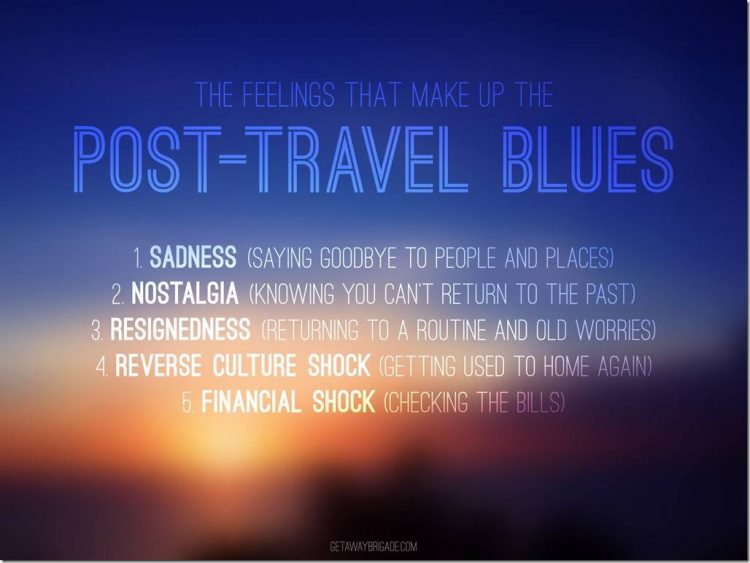
5 Typical Post Travel Depression Symptoms
The symptoms of post-holiday depression can really include some or even all of the following: anxiety, fatigue, irritability, mood swings, headaches, sleeping too much or too little, change in appetite, weight loss or gain, inability to concentrate, increased desire to be alone, and loss of interest in things you usually enjoy.
Clinical psychologist Linda Blair says: ‘Bear in mind it takes a good three days to wind down when you go on holiday so likewise, it will take you a bit of time to re-immerse yourself in real life.’
My Story of Travel Depression Anxiety:
We recently came back from a family holiday to Cambodia . I am now on long service leave and therefore have no job except for blogging to return to, I thought our return from Cambodia would be a happy one!
However, knowing we are home-bound for my last trimester of pregnancy and the birth of my baby has escalated my post-traveling depression to a new dimension.
There is nothing like feeling like you are stuck!! That you have no choice but to be where you are right this minute!
No matter how strong you can feel the pull to explore and wander some more.
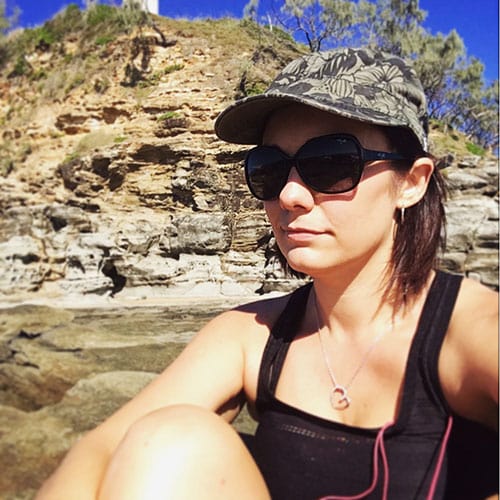
I think that to some extent all of the points in the image; that outlines the reasons for depression after traveling; applies to our return after coming back from holiday! Understanding post-trip depression helps you to move beyond the symptoms.
1. The sadness from leaving behind a new country explored, the friendships made along the way, and the favorite destinations in the country that connected with your soul, all of which have the potential to leave you feeling depressed after traveling.
2. The nostalgia that comes from having an awesome trip and knowing that it is a once-in-a-lifetime memory!
3. Having to return to the routine of life , the school lunches, the school drop-offs! Having to do our own washing again and make our own meals.
Knowing that there is no adventure or excitement awaiting us every single day and that some days will just be ‘boring’ as we get some jobs and housework out of the way!
4. Reverse culture shock ! I think we have felt reverse culture shock to the extremes on our return from our two last trips!
Visiting countries where people have to go through a harder lifestyle than us and experiencing how people who work incredibly hard and have so few material things against their names, can be so incredibly happy with life!
And here we are, lucky and fortunate in a country where luxury is almost a given and material things consume our lives! The difference between our lifestyle compared to theirs really struck us!
5. And of course, even as travel bloggers we still come home with a credit card bill that we need to repay before our next travels!
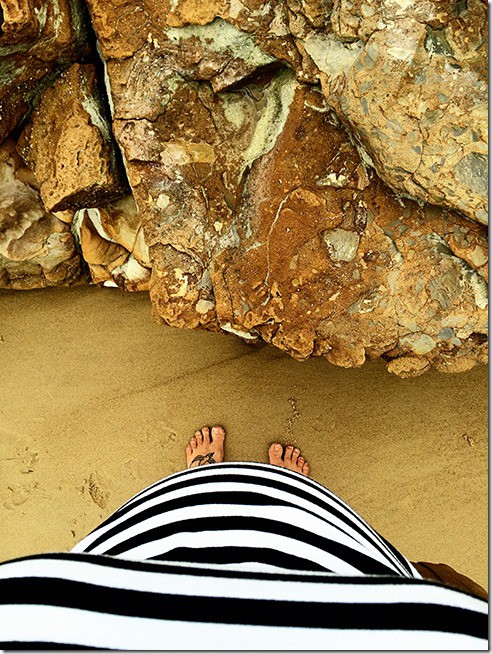
At 24 weeks pregnant, I could barely see those wanderlust feet of mine!
I have restless soul syndrome! And this being ‘stuck’ at home is making my after traveling depression pretty damn real!
How to Beat the Post-Travel Depression
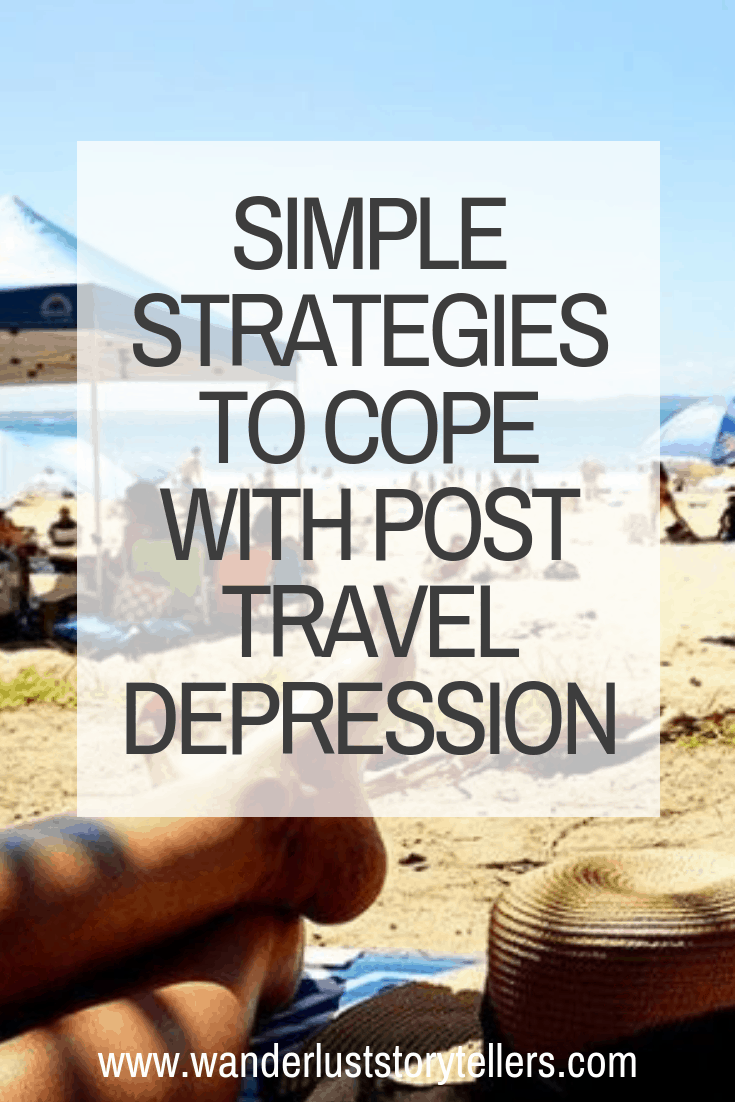
Below is a list of ideas on how to deal with post-travel depression.
Now as an important side note, if you have more than post-holiday blues and it is edging towards severe depression after vacation, you really need to stop reading my post and get yourself some professional help.
1. Allow yourself time to adjust
It is important to realize that it is pretty normal to feel depressed after travelling.
And often we used up our energy on an adrenaline rush to explore a new destination, only to get back home with little to zero energy left for the normal everyday stuff.
Next, it is important to deal with jet lag. “The body clock, which is in the brain in the hypothalamus, takes a few days to adjust to the timing of light and darkness at the destination, and this disrupted rhythm results in a host of unpleasant symptoms, including tiredness, headache, disorientation, poor concentration, and indigestion,” explains Dr Peter Prendergast of Venus Medical.
Allow yourself time to adjust and do expect a level of after-trip depression to show up.
If at all possible, build in an extra vacation day at the end of your trip to simply be at home and recover!
2. Keep hold of your Travel Memories in a creative way
One of the easiest ways to help move past the depression after travel is to start working on recording those travel memories in some creative way.
“Research has shown that if we can recall positive memories they can boost our positive emotions at the moment,” says Dr Green, a clinical psychologist and founder of The Positivity Institute.
- Turn your favorite travel photos into canvas prints. We love finding cheap canvas deals with Easy Canvas Prints. Grab your 25% off plus FREE shipping with our link.
- Make a slideshow or montage from your favorite travel photos and videos. Then you can easily watch it back and revisit your incredible memories, plus you can share it with friends.
- Write blog posts about your travels.
- Create a coffee photo book for your vacation. My go-to photo book printing company is Blurb!
- Get hands-on and lose yourself in the art and craft of scrapbooking. I love to create travel scrapbooks of my trips so that I can include ticket stubs and pamphlets from the holiday. A brilliant product to organize all your ticket stubs is Just the Ticket: Ticket Stub Organizer . A really awesome product!
3. Be a Tourist in your own Area
While we are grounded for the last trimester we are doing our best to keep the wanderlust bug at bay by exploring more of the local area!
Recently we had a beautiful and relaxing day exploring all that Noosa on the Sunshine Coast has to offer! Blog research of course!
But at least it gets us out and exploring. I think this view says it all!
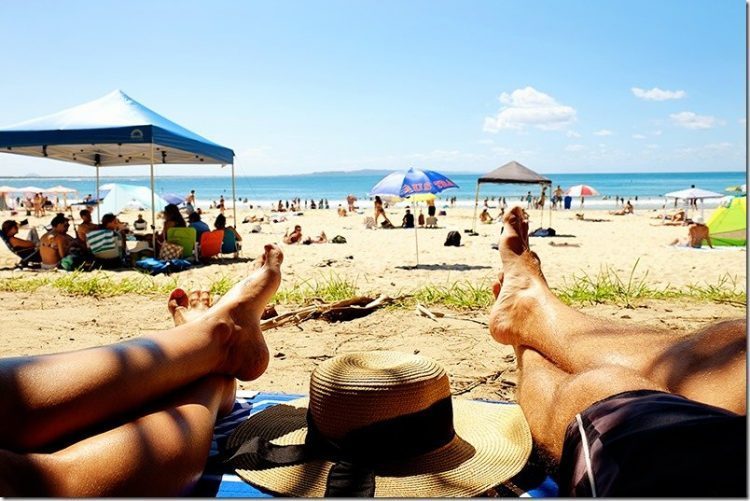
4. Evaluate what isn’t working
Maybe it is time to look at why home life is so depressing. Are you too busy? Do you need to change your job?
Do you need more balance in life? Do you have fun hobbies and activities that you participate in?
Ask yourself some questions and try to understand why being home is so hard. Can you make any changes?
A really good book to read is The 4-Hour Workweek: Escape 9-5, Live Anywhere, and Join the New Rich . It is a great eye-opener to looking at life with fresh eyes and reevaluating whether the 9-5 lifestyle is making you happy.
5. Practice thankfulness through a gratitude journal
My passion area in counseling is meditation and gratitude. Gratitude is so incredibly powerful.
When you express gratitude (or thankfulness), you create a surge of ”feel-good” brain chemicals like dopamine, serotonin, and oxytocin.
In fact, several studies show that being grateful reduces the risk of depression.
I did a research project in my master of counseling that was centered around gratitude’s connection with well-being and happiness and the results were incredible!
There are two super easy ways to practice gratitude. You might choose to share your thoughts on thankfulness with another person.
We do this every night around the dinner table. Or for those who love to keep their thoughts private, you might choose to express your gratitude by journaling.
I personally love The Gratitude Diaries: How a Year Looking on the Bright Side Can Transform Your Life ! You will be surprised how beneficial thankfulness can be when you are struggling with post-travel depression.
6. Start planning the next trip!
I love planning trips! That is something that I enjoy even more than writing about them post-trip.
So even though I know we can’t head anywhere far from home till baby-love is at least 6 weeks old, I am already planning and prepping for our next trip abroad!
A great way to do research for a new destination is to watch movies about travel , or why not get lost on Pinterest.
We have already bought tickets for our entire family for a trip to Bali, Lombok and Gili Islands!
I’m onto finding our accommodation and slowly making my way through figuring out which day trips will be newborn-baby-friendly whilst there!
It keeps me moving forward and it keeps me motivated! The blues are still there in the background, lingering around, but at least I can choose to focus on something more pleasant than to just sulk around!
Planning a trip, no matter how prematurely can be really beneficial.
Dr Green, a clinical psychologist and founder of The Positivity Institute, says: “Research tells us that anticipation of the experience of pleasure is nearly as pleasurable as the experience itself.”
So even if the trip is years away, go and start brainstorming where you want to go and what you want to see.
Books are always brilliant for inspiring some travel ideas. Here are some of my favorites!
7. Use journaling to foster positive change
Journaling is another powerful tool that you can make use of. It can be so ‘releasing’ to simply get your thoughts out on paper.
Clear out your brain for more positive and happy thoughts.
If your head is full of negativity, it can be hard to squeeze in positive thoughts, so grab a journal and release the thoughts that are currently there.
Make it a daily practice. And simply write 1-3 pages every morning or every night. Write whatever comes up in your brain, the idea here is to simply let go and get it out!
8. Pick a job that allows you to earn whilst traveling!
What do you currently do for a living? Could you incorporate travel into your career?
For example a teacher can teach anywhere in the world. A hairdresser can cut hair wherever they want. See our post on the best travel jobs in the world .
9. Find out what your future has in store!
How about trying something different and somewhat exciting? Reach out to an alternative option and seek a place that can provide you with a free psychic reading.
This way you might get a glimpse into your future and create excitement that open you up to new possibilities.
As hard as it is to live with post travel depression, especially when you know that there are no immediate trips in your near future, there is actually a positive side to the misery that comes from the blues that follows a holiday. For me it teaches you about aspects of yourself or your life that you are not happy with! Why did these emotions tackle me and what is it that I need to change in order to be happier to return home in the future? What is working in your life and what is not! Travel is addictive, but it is also important to have an addictive lifestyle that you are passionate about even when you are NOT traveling!
Benefits of Post-Vacation Blues
- Post-travel depression can help us figure out what we are not enjoying about our current way of life, and open our eyes to what we are truly passionate about!
- It opens our yearning to do more with our lives, to be more, to travel more, to learn and discover more!
- Post-travel depression is a great motivator to start saving those dollars for the next trip away!
- It makes you appreciate how lucky we truly are to be able to travel and explore other countries and other ways of life!
- It makes us re-evaluate how we live and makes us notice the things that we tend to normally take for granted!
- It makes us take action to break away from the normal routines of life!
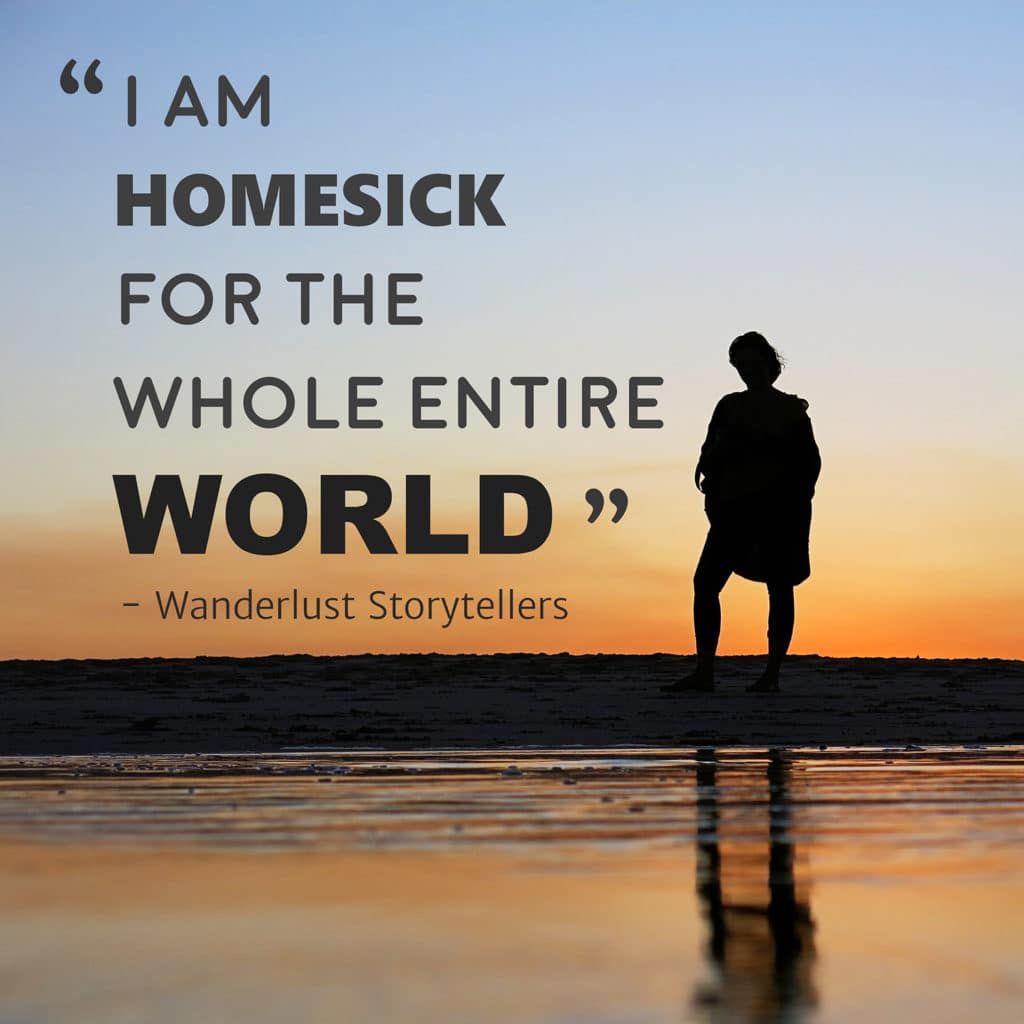
Post Travel Depression Quotes – Because for some Reason Quotes Help! What about you! Have you ever suffered from after holiday blues ? What did you learn from feeling depressed after vacation? What did you do to overcome your post trip depression ?
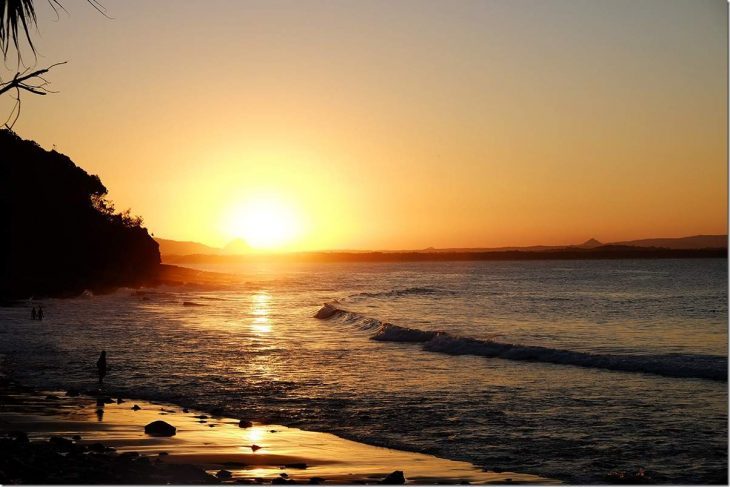
Beautiful photo of a sunset at a beach in Noosa National Park! Sometimes beauty lies just beyond your front door!
Travel; makes u grateful for what u have, but also opens your eyes to how different life could be!

Jolene Ejmont
44 thoughts on “what is after travel depression simple strategies on how to cope”.
as travel blogger somehow i feel greedy to explore all the world but when i see my pocket is empty but does not mean stopping from travelling
Yes very true!
I know this feeling too well – having several places that feel like home around Europe. In the end it’s always the people you miss the most! Would someone invent teleporting already?? 🙂
Yes please!!! 🙂
^^^ If only teleportation was possible, right? I was actually in Cape Town for 10 weeks and am back in the US. PTD has been hitting me quite hard and it’s so difficult to shake it off. I’ve met with friends and have been running errands all around but nothing feels right. It’s as if time stood still here and nothing has changed. I love my friends and family and am still in graduate school, so I do have things to take care of, but nothing compares to the experiences I had in South Africa. I felt as if I had so much growth abroad that it’s hard to avoid reverting to old ways being back home. The only thing keeping me motivated is planning another trip. Just have to figure out the financial means to make that happen again.
It is hard isn’t it!! Especially when you connect with destination as much as you have in SA (I love Cape Town! Can’t wait to return myself!). I think the more we travel than more we yearn for more and more and more! I hope you get to travel again soon!! At least planning the next trip is exciting, we have 2 weeks till our next trip and I can’t wait!!
Struggling big time now. Been home 4 days and can’t stand it. Next 4 trips are booked in but I just wanna go now!!
It is hard isn’t it!! Best way is to just be on a permanent holiday … if only that was possible!! Hope that next trip is soon for you! 🙂
Currently suffering PTD ???? Just camr back from almost 3 weeks in Japan & its hitting me at some times of the day. Having been to Japan vs my hometown is very depressing as I can see the wide difference… trying to shake it off… this has been the longest vacation I had.. now I’m trying to plan my next trip back as a diversion… even normal.office routine is hard
Yes!! PTD is not fun! I have experienced it and have seen it in my friends too! We just came back from a 3 week trip to Japan too! Talk about a coincidence!! And yes, I am in full swing planning our trip to France!!! Trying to keep busy, but already over the routine of life at home! Hope things look up for you soon Mylene!
Just returned from a 2 year trip, I definitely feel it! You are on point when you say that it makes you realize how lucky we are to be able to travel. And reverse travel shock? BIG TIME! I love returning home but it only takes a few short weeks to get me ready for the next adventure!
Edit: Reverse CULTURE shock*
The part where you said “it teaches you about aspects of yourself or your life that you are not happy with” really resonated with me. After coming back from my travels, I always get a clearer perspective of what’s keeping me unhappy and what sort of changes I should finally make to move towards happiness. Very awesome and insightful post!
Exactly! And whilst that might be hard, change and moving forward in life is always good! 🙂
Sometimes we just don’t want to go back to real life, it takes a few days for us to get back to normal after traveling to awesome places.
Yes, I think it is normal to have a few hard days back in reality! The problem is when those few days turn into weeks or a month 🙂
I came back from my first trip abroad. I had some sought of internship in London . Then I visited Scotland where I had so much fun and met so many people. After that I went to lake district where I took part in many adventure activities . Overall I felt different about myself and I felt different I can’t explain it . It was roughly 1 and a half month trip. Now I am back in India and I just miss everything . Sometimes , it feels like I was a whole different person .
Hi Manvi, I definitely think that you can be a different version of yourself in different cultures. I know that I felt more ‘at peace’ with myself in Italy. I hope that you adjust back to life in India soon and that you can experience more trips/internships in the future! Thanks for sharing your journey 🙂
Shout out to you people ….I love travelling but this was my first trip in 5 years to new York …it’s already been 22 days I came back from my vacation …I still feel like my mind doesn’t belong to where I am now ……those beautiful moments captured in camera makes me smile and I think why I had to leave those moments ….I wish I had a time travel machine….hope life will come down to normal ….but till now I don’t want to be where I am now ….just want to go where I was for two weeks ….is there any medicine to come over this depression ? I am in London now …
Hi Rana, it is fairly normal to feel like this! We just returned from a trip to Europe and it has been a struggle to adjust again. My heart just wants to head off again! It normally does fade over a few weeks time as you adjust back to normal life. But if you find that it doesn’t, see a doctor as they can prescribe some meds to help you if you need.
Hi Jolene, When I got back from my 2 weeks trip from Japan last year, I kept dreaming about the country every night for 2 weeks. Thanked God, I could overcome it after all. It was not easy though…. 🙁
I know this inclination too well – having a few places that vibe like home around America. At last, it’s dependably the general population you miss the most
Yes, it really can be like that when you just easily click with the culture of the destination you are visiting! 🙂
leaving tmr and the PTD is making me so upset, its already been a month time flies
Excellent Post. I guess, Stress is the most common thing that can be seen after Holidays. For that, I always make a list of all the things I want to do as soon as I come home. I think doing something exciting inspires you to live more and stress free. Infact I have watched a video also in which tips are given regarding how can we cope up with Post Holiday Blues and I really liked the third tip which states – Wear something you feel good in. Wearing something you like will definitely boost your mood. You can also take a look on the video https://www.youtube.com/watch?v=tEAYxer0kws , the other tips are also really useful.
Thanks Ashpreet! Great tips and thanks for sharing thanks for sharing the link to the video for those who would like to watch it.
Thank you for this, I thought I was losing my mind. Just back from exploring Bali and Thailand for a month and feel like I am in an alternate (sad) universe, crying for no reason. Grateful you shared about this and also write about the benefits, it is helping me, thank you!
Glad to hear it was helpful Talyn – Hope you recover from the PTD soon!
I just got back from Bali with my husband..beautiful country amazing people..we had initially went for a yoga retreat but unfortunately it wasn’t a good environment and our teacher did not plan well so we left the retreat and stayed in UBud for a few days..but before that the beginning of our vacation started at a resort before the yoga retreat and my husband suffered tremendously from the long plane flight and had possibly blood clot..so we spent several days back and forth to health clinic and hospital. Luckily they were able to help..but I think the stress with that plus the yoga retreat not being what we had hoped and then the long flight back home just took a toll on me 🙁 it’s been a week and I’ve had zero energy during the day and I’m wide awake at night 🙁 I feel resentful for the yoga teacher charging us 4,000.00 and have emailed her for 50% of our money back another lady was also upset with the environment and left too. We also had to pay for the hospital charged and unexpected hotel cost etch which was ok but I had this vision this would be the best trip ever and it wasn’t 🙁 all my friends were so excited to hear about our adventure and I just wanted to cry. The one thing that’s helping me is the new friendships I did make and the exposure of the culture and beautiful people…
Hi Marie, sounds like a disappointing trip. Sorry to hear about all the drama. Unfortunately, things sometimes go wrong no matter where we are in the world. Did you have any travel insurance for the trip? You should be able to claim for the hospital expenses etc on that? Hope that the yoga retreat helps to refund some of your money for you. I’m glad to hear that you are ending your comment on a happy note and I hope that the next weeks will go a bit better for you.
I am really glad to have come across this because I made me realize I am not alone in this struggle. I usually feel depressed every time I return home from a holiday that I enjoyed, and I find it hard to get back into the daily monotonous routine of life, such as going back to work, etc. I suffered a major bout of PTD about four years back after I returned from a trip to New Zealand. It was only a two week trip, but I guess I loved it so much I didn’t want it to end. Just got back a few days ago from a trip to Japan, and I am feeling the same way. The f funny thing is, the first couple days of the trip I am actually abit homesick, but then its like I start to get attached to the place and miss it so much once its time to go home. Its difficult talking to others about it because quite often they don’t really understand, they just feel you should get over it, and they may not share your own love/passion for travel. It is hard, but I also realize that all good things in life have to come to an end at some point. Rather than be depressed that its over, I try to be happy that it happened, and that I actually got the opportunity to go to these places. And of course, there is always tomorrow, and the chance to go back again one day. But its great to know I am not alone in this!
Thanks for sharing your story AGM. I love that you finish off your comment with loads of positive vibes and with a positive outlook on the future! All the best to you!
I just traveled to bali one week ago, and I’m still suffering PTD until now 🙁 what makes me sad the most is my friends. My friends and I went to Bali, we did everything together in there and now it feels weird when I’m not around them
That sounds hard Risma. Do they live close that you can organize some regular catch ups with them to help you a bit? Or maybe you guys could start planning your next ‘friends’ holiday?
I’ve been back for almost 3 months after 2 and a half years away travelling and STILL have bad PTD. No motivation to leave the house and wanting to be alone. Fear of reality. Enjoy spending time with my family but avoiding everyone else. I’m slowly getting better but it hit me hard.
Oh, Felicity that really sounds hard. I hope you have been getting some support from family and seeking some professional help you guide you through it all.
Thanks for this! We just returned from a 3 week trip to Israel where we celebrated our son’s Bar Mitzvah so it was a super special one to boot. 1 day in and I’m already experiencing PTD! Love your suggestions and will repost to my blog, AlyaBuzz! thanks and congrats on the baby!!!
Thanks so much! 🙂 Glad you found the suggestions helpful. Sounds like you had a super special trip!
This has helped so much. Thank you. I didn’t even realize there was a name to this phenomenon until recently, and already I feel much more not alone. I almost always experience PTD for trips which are longer than a weekend or a few days. Just yesterday I got back from a trip to Southern Africa. We started in Joburg, went to Kruger, Vic Falls, Sossusvlei in Namibia, and ended with Cape Town, and there were layovers both ways thru Istanbul. Altho the trip at times felt rushed since we squeezed in so much in just over two weeks, and there were tensions among us due to the difficulties of cohabitation with, (there was actually a couple fights with one friend), the trip overall was the blast of a lifetime, and really changed me personally. One friend in particular is very special to me, and I miss him the most already. The San Francisco Bay Area feels like a different planet from Southern Africa right now, even though I may have noticed similarities when I was actually there on the ground. I know I’ll get over it, but it’s just really tough right now. Maybe I’ll check this out in a few weeks and reflect back on my feelings then from now 🙂
Thanks for your comment Bobby. Grateful the post has helped – sometimes just knowing that your feelings are fairly normal helps your brain settle a bit. I do find that it hits me more when I visit countries that are just so diverse and different to Australia that I call home. Will be interesting to see your reflection in a few weeks, hope you leave us another comment 🙂 All the best.
Think I’m a bit late to the party here but so glad I found this post of yours. I have always struggled with PTD, as long as I can remember, but this time it’s worse than ever. I had a really rough year, I struggled with mental illness quite bad and ended up quitting my job. I moved to NYC after graduation and have a studio apartment there, so I spent most of my time there this year lonely and waiting for better days ahead. I just returned from my dream trip to Australia and New Zealand, went with my dad and stayed for almost a month. For the last few months this trip has been the only thing on my mind, the one thing that was getting me through everything else. I’d think “yeah ok today sucks but get through 60 more of these and then you get to go on your trip”. Now it’s over and I have to face that my day to day life isn’t something I’m happy with. I’d love to change direction but I’m fairly scared to. Not to mention I can’t help but think back to all the amazing times my dad and I had on vacation, and instead of the memories making me happy, it’s making me cry because I was so happy and it’s so different from how I normally feel. I also just miss the vacation excitement, waking up every day in a beautiful place ready for an adventure. I just hope this eases soon, I’ve dealt with it before but never to this extent. I had a panic attack on the flight home yesterday and have been having more since. Ugh. Anyway, I also find it funny that you live in the exact place I’m dying to be back at, yet you deal with PTD coming back there from elsewhere. So funny how where we live changes our view on everything. I’d love to be back in Noosa and on the Sunshine Coast but I’m sure if I lived there it’d be completely different. So weird how that all works.
Thank you very much for the comment Sarah, and apologies for a much-delayed reply.
As you said, it is funny how where we live changes our view on everything… We love coming back to Australia and to our home on the Sunshine Coast. Saying that, we still get the PTD regardless.
Hope that you will visit hte Sunshine Coast again soon 🙂 or that you have already been again, since you wrote this comment.
All the very best and safe travel in the future.
Thanks for writing this post. It’s inspired me to write about post holiday depression too 🙂 I’m certainly going through these strange feelings and crazy mixed confronting emotions with every interaction I’m having. It’s nice to read people have similar experiences
Yes, I think all travellers experience PTD to some extent. It is especially hard to not travel in the current times. All best to you and glad that we could inspire you to write about it as well. 🙂
Comments are closed.
2024 - Wanderlust Storytellers. All Rights Reserved.
About Us | Contact Us | Work with Us | Privacy Policy | Disclaimer
* Disclaimer: Wanderluststorytellers.com is a participant in the Amazon Services LLC Associates Program, an affiliate advertising program designed to provide a means for sites to earn advertising fees by advertising and linking to amazon.com and other Amazon sites.
Our Cookie Policy
We use cookies on this site to enhance your user experience. By continuing to use our website you agree to our Cookie Policy.
How to Deal with Post-Vacation Blues and Be Happy Again

Traveling the world for a short or long period is always incredible. None of the experiences you get home can’t be compared to those you get abroad, as every country has its own culture and traditions. Therefore, you experience wonderful things that you can’t at home. And no matter how long you travel, going back is always both exciting and a bit sad.
Travelers who get back home after a couple of weeks of travel can feel sad after vacation they just spent on a sunny beach, in a busy but adventurous city, hiking and trekking in various gorgeous places, or visiting family and friends. But travelers who get back home after a year or so might even experience the so-called post-vacation depression .
End of vacation blues always hit travelers since the trip is coming to an end, and the “normal” life is all around. It usually occurs in the last week or the last several days of a trip. And while on the last run of completing the things-to-do-during-the-trip list, this feeling will dissipate for a couple of weeks after you arrive home.
Travelers who used to discover the world, explore diverse locations, meet people, and pursue their goals freely, now have to get back to the point they were left when their journey started. And that is not always easy. No wonder post-travel depression is an expected occurrence.
So, while you may be one of them, you are probably seeking answers. You may have a lot of questions now as life has changed for you, but not for those who surround you at home. That’s why we’ll answer some questions that may appear in your mind, and after that, we’ll provide you with some tips to overcome your after trip depression.
What Is Post-Travel Depression?
It is a feeling that is usually experienced by travelers who get back to the life they used to live before they went on traveling. Not every traveler experience it, but the majority are having it due to the high transformative feature of travel. No matter how stubborn is a person to new conditions, he might get changed after a trip. People who travel around the world and feel on their skin diverse life situations, occurrences, events, discover traditions, culture through interacting closely with the locals are more likely to get depressed after travel.
Why Do I Experience Depression After Traveling?
As said, travel is highly transformative. People’s minds and life aspects get changed as they get to perceive the world differently when they see, feel, think about, and experience on their skin things that can’t be experienced while living in a constant ambiance. By traveling, you discover a brand new world, and if you carry back home the knowledge and experience you got from your trip, you will find out that it doesn’t fit in the reality you just got back to.
How to Actually Overcome Depression After Vacation?
As depression can seriously impact mental health, overcoming it is vital for your well-being and, consequently, for the quality of your life. Keeping a positive mindset is the key factor, and as you are already seeking an answer, you are just a few steps from being happy and motivated again. After all, knocking over post-trip depression is just a matter of time and is on the length of a great piece of advice. Read on to find out several tips on the topic.
1. Keep You Schedule Busy on the Last Days of Your Trip
To capture every positive memory possible, get your schedule busy on the last days of your stay in a foreign country. Go to a masterclass and learn something new. For instance, attend a photography workshop or a cooking lesson. Visit the places you haven’t been to yet and capture gorgeous pictures of them. Have one last dinner in a location that you know will remind you about your trip years ahead.
Inhale every moment of your trip and keep them in your mind and heart. Travel depression, in this case, won’t have time to hit you, as you will be busy doing other significant things than being bored and sad about your travel ending.
2. Don’t Rush to Work and Study (If Possible)
If you go right back to work or study, it might be indeed hard to perceive the life that you used to live a while ago. Post-travel depression symptoms include apathy, unmotivated state of being, and even loss of appetite. And work won’t make matters better, as you may feel life dreads more at work than anywhere else.
Getting time-off before you get back to your previous routine will provide you with the possibility to unpack, to get rid of jetlag, get comfortable back at home, sort through your memories, meet some of your friends, and get accommodated with your new life. This will offer you the time to transition back to the life you had before you went on to travel and you won’t feel as depressed.
3. Meet with Your Friends
Connecting with friends is always good, as you can have their support, their friendship, their love and care. When you get back with your beloved ones, you don’t feel the pressure of the reality as hard, as you might have their hand of help anytime you need it. What’s for sure, they will want to hear your story. When recollecting your travel memories, you don’t feel as stressed, and there is always hope of getting back to traveling.
Though it sounds easy, it might bring a feeling of nostalgia. So, it is essential to keep a positive mindset and, therefore, make your memories a weapon against bad mood, depression, and stress. Let memories be your sunshine on a rainy day and your good news on a bad day.
4. Follow the Mindset of a Traveler
Who says you can’t be excited at home as you have been when traveling? You had experienced a lot of exciting things when you were on a trip, got engaged in fun activities, and tried a ton of good food, but that doesn’t mean you can’t do the same at your place.
To overcome the depression after coming back from vacation, don’t hop on your usual routine instantly and proceed following it without any changes. Pamper yourself with exquisite dinners from time to time and go to some cooking or dancing lessons (learn something new). This will definitely boost your mood, and you won’t feel nostalgic as when you’ll follow your usual routine.
5. Don’t Stop Traveling
You may experience exciting things at home as if you are on a trip when you don’t stop traveling. Yes, it is possible to keep your traveling routine at your place by exploring the surrounding you have to live in now. Go to a local museum and learn about some historical things, go for a walk around the city, visit some monuments and take tons of pictures. Even usual things might hide something unexpected and exciting, so why not give it a try?
6. Share Your Story by Sharing Photos from Your Trip
When coming back from vacation, depression might hit you hard if you don’t share your experience. At the point when you return home, your friends and family might be already pissed off by the multitude of pictures and stories you have provided them with when traveling. But that doesn’t mean you have to hold back your feelings. Share with the world the best, or the worst, things you have encountered while on a trip, and let your feelings flow.
7. Read / Create You Travel Blog or Travel Diary
In addition to the previous tip, you might also want to share your story that you wrote in your diary while traveling. Vacation depression can affect your mental health a lot if you hide your feelings. Sharing with someone what you experienced when traveling might help you as you will cheer up when you recollect the best moments you have had.
If you don’t have any written records of your travel experience, perhaps creating a travel blog or a travel diary can sweep your sadness away. This will keep you busy, and you won’t have time to feel nostalgic. What’s more, you will experience incredible moments of your journey when recollecting them.
8. Adorn Your Home with Souvenirs
You might have brought home a ton of souvenirs from your journey, and now it’s time to decorate the house with them. Take your time and seek the best place for every specific item. You will be delighted to reminisce about the stunning moment of your trip every time you put in your hand a piece of souvenir, and this will definitely bring a smile on your face. Additionally, your mood will be boosted every time your glance falls on one of them. Isn’t it a wonderful feeling?
9. Make Travel Plans
No matter how severe depression after vacation may be, don’t stop making travel plans. Yes, you are at the point where you left a month, half a year, or more than a year ago. But that doesn’t mean your travel has stopped here. The reality is as it is, and the best you can do is to accept it and find ways to apply your knowledge and experience. This might cheer you up a bit, as well.
If you keep the hope to get back to traveling again, the feeling of nostalgia won’t knock you out at all. You are the master of your dreams, so why not keep dreaming of traveling? Just don’t fall into your imagination completely. There is a reason you are back now. So, find it, keep living, and travel when you are done.
10. Pamper Yourself
To beat the depression after returning from vacation, relax as much as you can. As we previously said, take your time to accommodate (if possible) and then get back to your usual routine. You might have had no time to care about your appearance and health as much on your trip, but now, as you are back, you can relax and pamper yourself with a spa or massage session, healthy food, and perhaps, you may want to hit the gym, again.
11. Help Travelers
Now that you are home, you won’t be considered a traveler anymore. Now you are a native. That means you can help travelers who visit your place, just like you were by inhabitants of the area you visited a while ago. If you see people on the streets, who are carefully inspecting a map or are wandering around confused, give them a hand of help.
If you want to go further, you can join a forum conversation and help visitors traveling to your place with guidance on locations and places. If you know a lot about the area you have visited, you might want to share with your experience by providing travel suggestions and information, as well.
Post-vacation blues are a common occurrence, and overcoming it might be different for everyone. If you follow the above-mentioned tips, you are going to feel a lot better. One for sure, you know how to get over post-vacation blues now.
Spell out your feelings and your opinions in the comment section below, and make your story heard out. We are always happy to hear your stories and give you the support you may need.
Last Updated on December 10, 2019.

Feeling Sick After Vacation Is More Common than You Might Think
- Share to Facebook
- Share to Twitter
- Share to LinkedIn
- Share on Email
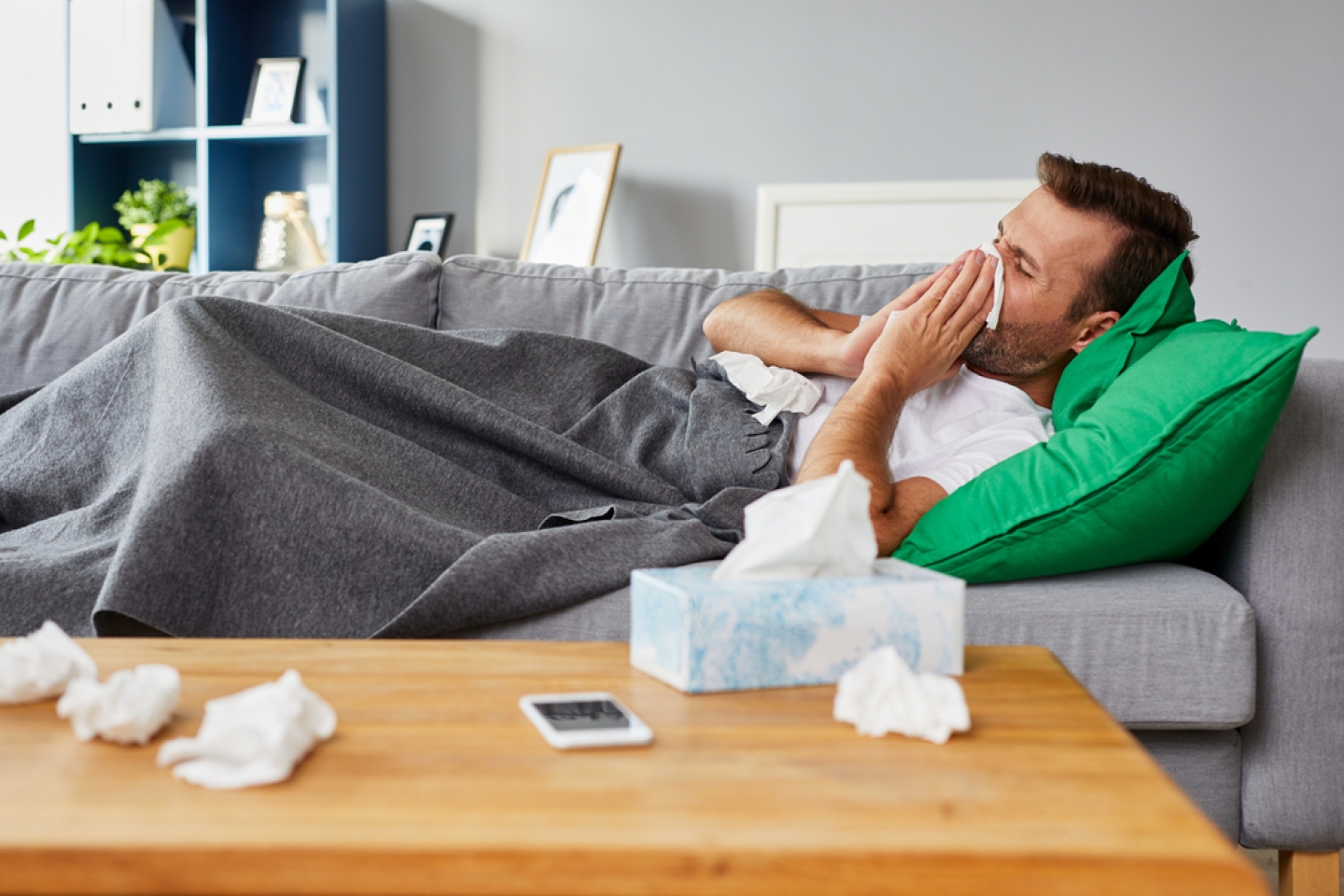
For most of us, a summer vacation is that long-awaited event we plan and dream about for months. A vacation is supposed to give us a chance to chill. To relax at the beach, experience nature in a national park or explore another culture. How ironic, then, that so many people need to take a vacation from their vacation!
From flu-like symptoms to digestive tract upsets, feeling ill post-vacation affects up to 80 percent of returning travelers, says Dr. Ashima Oza, a primary care physician and an i nstructor in the Division of Medicine at Weill Cornell Medicine. These illnesses—mostly mild viral infections—happen for a variety of reasons , including a weakened immune system, traveling between different climates, poor hygiene and air travel.
A weakened immune system
“When you travel,” says Dr. Oza, “ y our usual routines are disrupted. You may not be sleeping as well as you do at home, and y our eating habits change when you’ re away. You may be staying up later, consuming more alcohol and getting less exercise than usual. You’re also more likely to be in crowded places for prolonged periods, interacting with a more diverse population than you’re used to.” All of these factors can weaken your immune system and set the stage for getting sick.
Traveling between different climates
Abrupt temperature changes can take a toll . These rapid alternations between hot, warm and cool conditions force your body to adjust to different climates before it has a chance to process the information.
Poor hygiene
For the past few years, we’ve all learned about the importance of frequent hand-washing to protect against COVID-19. But some of us forget this basic practice when we’re away from home. H and-washing can also prevent us from catching other bugs , including those that cause colds and flu-like symptoms , well before flu season.
Leisure sickness
Though not universally recognized , leisure sickness is seen by its proponents as a psychological syndrome affecting people who don’t take the time to relax, even over the weekend. It is believed to cause post-travel flu-like symptoms , including body aches, headaches and fatigue .
Air travel
Airplanes can be breeding grounds for bacteria and viruses, from cramped conditions to the low humidity that characterizes the air circulating on board. Low humidity can dry out your nasal passages and irritate your throat. As a remedy, drink plenty of water and wear a mask during your flight to keep bacteria and viruses at bay.
What are returning travelers’ most common complaints?
“Diarrhea, fever and rash are the most commonly reported symptoms among post-vacation travelers,” Dr. Oza says. “But anecdotally, I see more respiratory infections in this group, possibly linked to the coronavirus pandemic.”
How should I deal with feeling sick after my vacation?
In most cases, she says, illness after travel is due to a viral infection that usually resolves in 5 to 7 days.
“For mild symptoms such as a runny nose, congestion or a sore throat, supportive care is sufficient,” she says. “That includes acetaminophen or ibuprofen for pain relief, warm fluids and rest. However, in the case of more severe infections that come with fever, chest pain or trouble breathing, get in touch with your doctor’s office or go to the Emergency Room.”
Tips for getting back to normal
- Get enough sleep
- Limit alcohol consumption
- Drink plenty of fluids
- Take it easy until you feel better
Make an appointment with your primary care physician at Weill Cornell Medicine.
Related Links
Back to News
In This Article
Clinical service.
- Product reviews & giveaways
- Write for Us
- Love & Marriage
- Babies & Kids
- Style & Decor
- Savings & Budget
- Work from Home
- Living Abroad
- Valentine’s Day
- Saint Patrick’s Day
- Mother’s Day
- Father’s Day
- Thanksgiving
- Holiday Gift Guide 2020
- Holiday Gift Guide 2018
- Holiday Gift Guide 2017
- Holiday Gift Guide 2016
- Trips & Vacations
- Products & Deals
- Reviews & Giveaways
- Entertainment
- Apps & Tech
- Fitness & Sports
- Tips & How Tos
- Make Money Blogging
- ShareASale Bonus Posts & Ads
- Blog Updates
Post-Travel Depression: Why It Happens and How To Remedy It
Disclaimer: This article is meant to provide general information. For advice related to your specific situation, please consult a doctor or therapist. See our disclosure here .
Presented by BetterHelp.
Have you ever heard of post- travel depression? It’s a phenomenon that happens to many people, and there’s a good scientific reason for it. Although depression can happen during a trip or a move as well, many people feel a huge disappointment when they return from something they’d put so much time and planning into. Let’s take a look at why it happens and how to remedy it.
Why Do I Feel Sad After a Trip?
Feeling sad after a trip is normal, but why does it happen? Although it’s not always depression itself, any form of disappointment, sadness, anxiety, anger, or regret after a trip might come up. There are many reasons for this, but some of the most common include:
- Past trauma related to traveling or not having the chance to travel
- Financial struggles
- Emergencies or unexpected events during the trip
- Dissatisfaction with your career, relationship/s, living situation, etc.
- Dissatisfaction with the town/state/country you live in
- Having many responsibilities at home
- Feeling overwhelmed with your home life or family
- Difficulty accepting reality
No matter the reason why you feel sad after a trip, you’re not alone.
Can You Get Depression From Post-Travel Blues?
Depression is a mental health condition that is characterized by long-term periods of deep sadness, an inability to care for oneself, and other distressing symptoms. It may feel like you can never get happy, don’t enjoy your life anymore, or wish to end your life.
If you are feeling suicidal, reach out to the National Suicide Prevention Lifeline today at 1-800-273-TALK (8255). They are available 24/7 to help. You’re not alone, and your life is important.
Depression is a mental health condition, so it does have to be diagnosed by a licensed mental health professional. But can depression be caused by post-travel sadness?
Depression can be triggered by a variety of factors, including feeling deeply sad after a trip. If your sadness lasts more than two weeks, is accompanied by common symptoms of depression, and impacts your day-to-day life negatively, you may be experiencing depression.
It’s important to speak to a professional as soon as possible if you’re exhibiting symptoms of depression after a trip. You can also research depression in more depth to see if you relate to the symptoms and experiences of those who go through it.
Remember, depression is highly treatable, and there are ways to get through it, even if it feels like there is no hope.
How Can I Stop Feeling Sad After a Trip?
If you’re looking for ways to stop feeling sad after your trip, try these tips!
Plan Your Next Trip
A great way to get your mind off of your previous trip and the disappointment you may feel in being home is to plan your next trip. Although it might be a while, planning something exciting can get you focused on something positive.
Consider how much money you need to save up, what you need to arrange, and where you want to go. Make goals for yourself, and work hard to achieve them. Having something to work towards can help treat sadness, anxiety, and depression!
Find Ways To Make Your Own Life Exciting
If you are feeling sad due to the circumstances in your current life, it’s important to deal with them by facing them head-on. Finding ways to increase happiness and excitement in your current life can help you feel more appreciative and content.
If you don’t like your home, find ways to decorate or change it so that it fits your needs. If you don’t like your car, start saving up for a new one. Although it can take a while, putting investments into things you truly want for your future is a good way to avoid future post-trip depression.
Figure Out What About Your Life Makes You Sad
It’s essential to figure out why you feel sad after a trip to be able to help yourself. If you’re unsure, it might be worth speaking to a therapist to figure out if you might be experiencing depression or anxiety after your trip.
If there’s something in your life that leaves you deeply upset, your therapist will be able to help you come up with coping mechanisms to deal with these things and potentially change them.
Consider a Change
Finally, if you’re truly dissatisfied with your life, there’s nothing saying you can’t change it. Although it can be hard to make major life changes, nothing is impossible.
If you’d prefer to live in your preferred vacation destination, whether it’s international or not, there may be ways to do so.
Here are some examples of people who were able to make big changes and find satisfaction in their lives.
Jane’s Story
Jane hated the town she grew up in and much preferred to travel to Canada once a year. Whenever she came back, she would become severely depressed and would end up needing to take medication. Jane decided she was going to move to Canada and went through a remote worker visa process. She was approved within a year and was able to move to a new city where she met new friends, got married, and changed all aspects of her life.
Jack’s Story
Jack worked as a designer in a small town in Illinois. He had always dreamed of moving to Brazil as an adult after his many trips to the country. After meeting a Brazilian woman and falling in love, Jack decided he was ready to make a move. He applied to remote jobs in the design field and was hired. After a few months of working and saving up, he moved to Brazil and sold his belongings. He married his wife and was able to eventually buy a house for much cheaper than in the US.
Conclusion
Although it may take time to understand your post-travel depression, there are ways to find happiness again. Sometimes, it just takes a week or two of feeling disappointed before you’re back feeling happy and energetic again. Other times, major life changes are in order.
If you do feel that you’re struggling with depression, consider reaching out to a professional therapist today. You’re not alone, and help is available.
Related posts
Deals & discounts, amazon associates disclosure, get personal and follow us on.
Please go to the Instagram Feed settings page to create a feed.
Why You May Have Flu-like Symptoms After Traveling
Cold & Flu
Jan 20, 2022
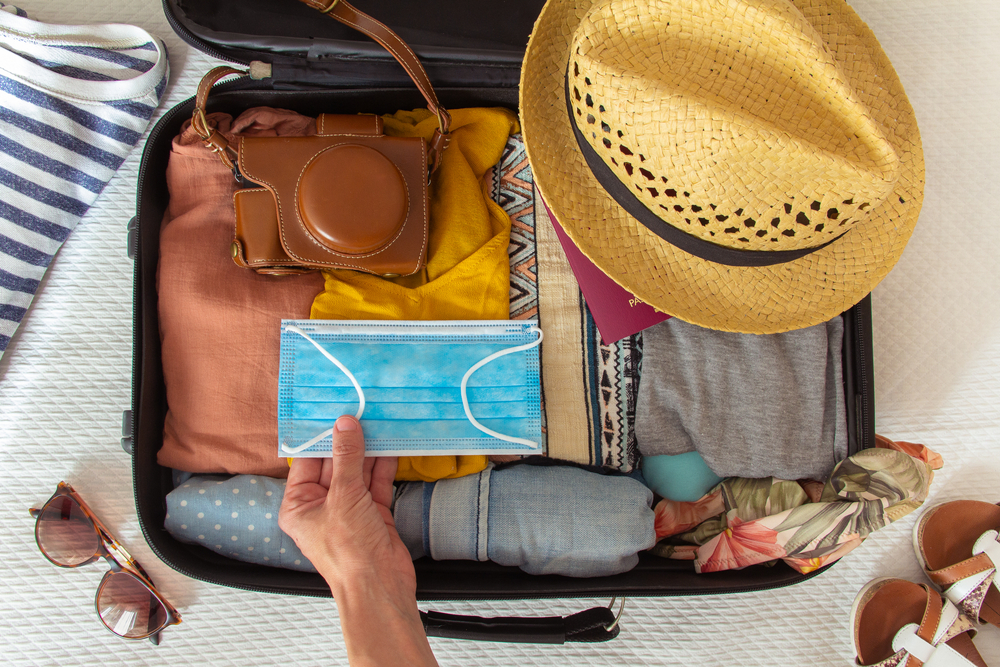
If you’ve ever felt sick right after returning from a vacation, you may be wondering why you’re experiencing flu-like symptoms after traveling. Is it normal to get a cold after traveling? For a lot of individuals, travel can be an exhausting experience and can take a toll on the body. Whether you’re taking a road trip or flying on a plane to your destination, it is common for travelers to return home feeling sick after traveling for a period of time. Many patients are curious as to why this happens, and we are here to explain.
If you have returned home from a vacation with more than just a souvenir, here are common explanations for why you may feel flu-like symptoms after traveling. For tips and tricks on how to keep from getting sick while traveling , visit our blog.

Weakened immune system
We typically take vacations as a way for our bodies to relax and our immune system to rejuvenate itself. So how can a weekend getaway leave us feeling ill? As we mentioned earlier, traveling can be exhausting. You may be staying up later, drinking more alcohol, or eating increased quantities of food. You may even be doing more or less physical activity than you normally do at home! These changes, especially sleep deprivation and alcohol consumption, can lead to a weakened immune system that can cause you to have flu-like symptoms after traveling.
Temperature changes
Traveling between different climates can confuse our bodies and make us more susceptible to illnesses because our immune systems aren’t sure how to react. Your body has to readjust to the new temperature before it can fight off any symptoms coming your way, allowing you to feel sick much faster. This can be combated with regulating your body temperature and, if necessary, some over-the-counter cold/flu medication.
Leisure sickness
This post-vacation fatigue can also be known as leisure sickness, a psychological effect where those who do not take time to relax regularly often fall ill on vacations or weekends. Leisure sickness, though not recognized by all psychologists, has similar symptoms to the flu including body aches, headaches, and fatigue. The best ways to combat these symptoms are very similar to our tips for staying healthy during flu season : keep an adequate sleep schedule, limit your alcohol intake, and practice healthy habits including exercise and handwashing.
Low humidity on airplanes
Airplanes can be a germaphobe’s worst nightmare. Being cramped next to strangers who may have brought a sickness aboard along with their carry-on bag can have you feeling gross after the flight. However, that’s likely not the reason you feel sick after traveling –– it’s generally due to the lack of humidity on the plane.
Low humidity can cause the nasal passages to dry out and cause irritation in the nose and throat. On top of that, bacteria and viruses can survive longer in low-humidity environments, making it harder for your body to fight off any infections you might catch aboard a plane. If you are traveling by plane, be sure to drink plenty of water to keep yourself hydrated. If necessary, wear a face-covering during your flight to keep others’ germs at bay.
Lack of hygiene and handwashing
When you’re traveling, it’s likely you’ll come into contact with many different people, areas, and surfaces. As we mentioned earlier, your immune system may already be weakened from the effects of traveling, making you more susceptible to bacteria and viruses. If you do not take the proper precautions to wash your hands regularly, you can be exposing yourself to other peoples’ germs. If possible, bring a small bottle of hand sanitizer with you wherever you go and practice basic handwashing techniques as regularly as you can.
What to do if you feel sick after traveling
If you have returned home and are experiencing flu-like symptoms after traveling, follow these at-home remedies for how to care for yourself with the flu . It’s likely that your body will readjust within the next few days with a little TLC (tender, love, and care). Get plenty of rest, drink plenty of fluids, and take it easy until you feel better.
However, if you notice these symptoms are either persisting or worsening, it would be a good idea to seek medical attention. For example, if you’re experiencing flu symptoms with severe stomach pain or feel you need an emergency IV for dehydration, head to the nearest emergency room for treatment. In the event that you have caught an illness, the medical staff will be able to care for you in a prompt manner.
Experiencing flu-like symptoms after traveling ? Complete Care is here to help.
Feeling sick after traveling can be a frustrating feeling, but try to remember that it’s normal to feel this way. Travel, even when done in the most cautious manner, can still be exhausting on the body. If you do find yourself in need of medical attention, the staff at Complete Care is here to help you feel better in no time. With low wait times and hospital-quality care, those flu-like symptoms after traveling will be a thing of the past.
With many ER locations all across Texas (including the Dallas/Fort Worth area) and Colorado, we are here in your time of need. We are open 24/7 for you and your family.
More Helpful Articles by Complete Care:
- Most Common Reasons for ER Visits During the Holidays
- 5 Winter Health Tips for How to Stay Healthy During the Winter Months
- Common Causes of Abdominal Left Side Pain
- Why It’s Important to Know Your Family Health History
- 5 Tips for Thanksgiving Dinner for Diabetics
Share this on
You are using an outdated browser. Upgrade your browser today or install Google Chrome Frame to better experience this site.
- Section 10 - Vietnam
- Section 11 - Rapid Diagnostic Tests for Infectious Diseases
General Approach to the Returned Traveler
Cdc yellow book 2024.
Author(s): Jessica Fairley
The Posttravel Evaluation
Common syndromes, general management.
As many as 43%–79% of travelers to low- and middle-income countries become ill with a travel-associated health problem. Although most of these illnesses are mild, some travelers become sick enough to seek care from a health care provider. Most posttravel infections become apparent soon after returning from abroad, but incubation periods vary, and some syndromes can present months to years after initial infection or after travel.
When evaluating a patient with a probable travel-associated illness, approach the differential diagnosis by incorporating both the patient presentation and risk factors related to travel (e.g., destination, duration of travel, and exposures; see Table 11-01 ). Salient points of the history of present illness and the travel and medical history, descriptions of common nonfebrile syndromes, and initial management steps are outlined below. The differential diagnosis and management for a traveler with fever (or febrile syndrome) is discussed in detail in Sec. 11, Ch. 4, Fever in the Returned Traveler .
Table 11-01 Elements of a complete travel history in an ill returned traveler
HISTORY OF THE PRESENT ILLNESS
Symptoms: primary & associated
Date of symptom or illness onset
Geographic location at time of symptom onset (e.g., while away, in transit, after return)
Healthcare received while abroad and after return (e.g., medications, hospitalizations)
TRAVEL DETAILS
Destinations visited and itineraries
Duration of travel (date of departure and date of return)
Reason for travel
- Business (include details about possible exposures and type of work done)
- Immigration
- Missionary, volunteer, humanitarian aid work
- Providing or receiving medical care
- Research or education
- Visiting friends & relatives
Accommodations and sleeping arrangements
- Hotel with or without air conditioning, window screens, or mosquito nets
- Safari, including camping outdoors, in a lodge, in a luxury tent
- Someone’s home
Transportation used
RECREATIONAL ACTIVITIES
Camping and hiking
Sightseeing
Water exposures
- Boating or rafting
- Fresh water (lake, river, stream) bathing, boating, swimming, wading
- Hot springs
- Hot tubs, swimming pools
- Ocean (diving, snorkeling, surfing; consider marine life exposure)
Other activities
Animal or arthropod bites, stings, scratches
Drinking water (bottled, purified, tap, use of ice)
- Raw fruits, vegetables
- Undercooked meat
- Unpasteurized dairy products
Insect bites (mosquito, tick, sand fly, tsetse fly)
Medical or dental care (planned or unplanned)
Disease outbreaks in visited destinations
Sexual activity during travel (document condom use, new partner[s])
Tattoos or piercings while traveling
VECTORBORNE DISEASE PRECAUTIONS
Adherence to malaria prophylaxis
Insect repellent use (25%–40% DEET or other Environmental Protection Agency–registered product)
Mosquito nets
VACCINES RECEIVED
Coronavirus disease 2019 (COVID-19)
Hepatitis A
Hepatitis B
Japanese encephalitis
Measles-mumps-rubella (MMR)
Meningococcal disease
Tetanus-diphtheria-acellular pertussis (Tdap)
Yellow fever
MEDICATIONS TAKEN
Malaria prophylaxis
All medicines taken (whether routinely or for symptomatic treatment), including antibiotics
- Herbal, complementary, alternative
- Over the counter
- Prescription
PAST MEDICAL HISTORY
Chronic medical conditions
- Autoimmune disease
- Heart disease
- Immunosuppressive conditions
Recent illnesses or surgeries
ADDITIONAL INFORMATION
Alcohol, tobacco, illicit drug use
Family history
Recent travel, domestic or international, especially ≤6 months
History of the Present Illness
As with any medical evaluation, the history of the present illness and associated clinical factors are the first considerations when approaching an ill returned traveler. Information about the timing of illness, immunization and prophylaxis history, itinerary, exposures, and comorbidities can help refine the diagnosis.
Timing of Illness in Relation to Travel
Because most common travel-associated infections have short incubation periods, most ill travelers will seek medical attention ≤1 month of returning from their destinations. Dengue and other arboviral infections, influenza, and travelers’ diarrhea are examples of infections with shorter incubation periods (<2 weeks). Diseases with slightly longer incubation periods, ≤4–6 weeks, include viral hepatitis, acute HIV, leishmaniasis, malaria, and typhoid fever, among others. Occasionally, some infections (e.g., leishmaniasis, malaria, schistosomiasis, tuberculosis) might become manifest months or even years after a traveler returns. Consider malaria in the differential diagnosis of any traveler who traveled to a malaria-endemic area ≤1 year of presentation. A detailed travel history that extends beyond a few months before presentation is important. The most common travel-associated infections by incubation period are listed in Table 11-02 , Table 11-03 , and Table 11-04 .
Table 11-02 Common travel-associated infections by incubation period: <14 days
Table 11-03 common travel-associated infections by incubation period: 14 days–6 weeks, table 11-04 common travel-associated infections by incubation period: >6 weeks, immunization & prophylaxis history.
When evaluating an ill returned traveler, review the traveler’s vaccination history and malaria prophylaxis used. Fewer than half of US travelers who visit low- and middle-income countries seek pretravel medical advice, increasing the likelihood that they did not receive pretravel vaccines and did not receive or take antimalarial drugs. Although adherence to malaria prophylaxis does not rule out the possibility of malaria, it substantially reduces the risk and increases the possibility of an alternative diagnosis.
Likewise, history of vaccination against hepatitis A and yellow fever would make these diseases unlikely causes of hepatitis or jaundice in a returning traveler. Remember to ask about routine vaccinations like measles-mumps-rubella (MMR) and tetanus-diphtheria-pertussis (Tdap). The most common vaccine-preventable diseases among returned travelers seeking care at GeoSentinel clinics during 1997–2010 included hepatitis A, hepatitis B, influenza, and typhoid fever. More than half of these patients with vaccine-preventable diseases were hospitalized.
Itinerary & Travel Duration
A traveler’s itinerary is crucial to formulating a differential diagnosis because exposures differ depending on the region of travel and the specific areas (e.g., rural vs. urban). A febrile illness with nonspecific symptoms could be dengue, malaria, rickettsial disease, or typhoid fever, among others, depending on the itinerary and endemicity of these infections. Being able to exclude certain infections based on the travel itinerary can help avoid unnecessary testing.
A 2013 study from the GeoSentinel Surveillance Network found that the frequency of certain diseases varied depending on the region of the world visited; among travelers with fevers, for example, dengue was diagnosed most frequently among travelers coming from Asia, while malaria was diagnosed most frequently among travelers returning from Africa.
Travel duration is also a factor because the risk for a travel-associated illness increases with the length of the trip. A tropical medicine specialist can assist with the differential diagnosis and might be aware of outbreaks or the current prevalence of an infectious disease in an area. The 2014–2015 Ebola virus epidemic in West Africa highlighted the importance of epidemiologic factors and travel itineraries in managing patients and protecting staff and the community.
Knowing a patient’s exposures during travel (e.g., consumption of contaminated food or water, insect bites, freshwater swimming) also can assist with the differential diagnosis. In addition to malarial parasites, mosquitoes transmit viruses (e.g., chikungunya, dengue, yellow fever, Zika) and filarial parasites (e.g., Wuchereria bancrofti ). Depending on the clinical syndrome, a history of a tick bite could suggest a diagnosis of tick-borne encephalitis, African tick-bite fever, or other rickettsial infections. Tsetse flies are the vector for transmission of Trypanosoma brucei , a protozoan that causes African sleeping sickness. Tsetse flies are large, and their bites are painful; patients often recall being bitten. Freshwater bathing, swimming, wading, or other contact can put travelers at risk for leptospirosis, schistosomiasis, and other diseases.
Accommodations and activities also can influence the risk of acquiring certain diseases while abroad. Travelers who visit friends and relatives are at greater risk for malaria, typhoid fever, and other diseases, often because they stay longer, travel to more remote destinations, have more contact with local water sources, and typically do not seek pretravel advice (see Sec. 9, Ch. 9, Visiting Friends & Relatives: VFR Travel ). Travelers backpacking and camping in rural areas have a greater risk for certain diseases than those staying in luxury, air-conditioned hotels.
Comorbidities
Underlying illnesses can affect a traveler’s susceptibility to infection as well as the clinical manifestations and severity of disease. An increasing number of international travelers are immunosuppressed, whether due to HIV infection, treatment with immune-modulating medications, being an organ transplant recipient, or other primary or acquired immunodeficiencies (see Sec. 3, Ch. 1, Immunocompromised Travelers ). In addition, several factors associated with travel can exacerbate underlying conditions (e.g., chronic lung disease, inflammatory bowel disease, ischemic heart disease).
Symptoms & Illness Severity
Although the symptoms of many infectious and travel-associated syndromes overlap, the initial symptoms and presentation should ultimately guide the differential diagnosis: gastrointestinal symptoms and febrile illnesses are the most common syndromes in returning travelers. Remember that conditions such as appendicitis, urinary tract infections, and domestically acquired viral infections also can present in returning travelers.
Severity of illness is not only important for patient triage but also can help clinicians distinguish certain infections. Is the traveler hemodynamically stable? Is the infection potentially life-threatening (e.g., malaria)? Does the traveler have a severe respiratory syndrome or signs of hemorrhagic fever? Some suspected illnesses might necessitate prompt involvement of public health authorities. For more details, see General Management, later in this chapter.
The 3 most common clinical syndromes after travel to low- and middle-income countries are dermatologic conditions, diarrheal diseases, and systemic febrile illnesses, each of which is described in more detail elsewhere in this section (see Dermatologic Conditions , Persistent Diarrhea in Returned Travelers , and Fever in the Returned Traveler ). Evaluate febrile travelers returning from malaria-endemic destinations immediately. Other common clinical presentations and findings include animal bites and scratches, asymptomatic eosinophilia, and respiratory illnesses.
Animal Bites & Scratches
Promptly evaluate any traveler who reports animal exposures during travel (see Sec. 4, Ch. 7, Zoonotic Exposures: Bites, Stings, Scratches & Other Hazards ). Consider travelers with animal bites and scratches as high-risk for rabies exposure, and provide rabies postexposure prophylaxis, as indicated (see Sec. 5, Part 2, Ch. 18, Rabies ). If the traveler was exposed to a macaque, herpes B postexposure prophylaxis might be indicated (see Sec. 5, Part 2, Ch. 1, B Virus ).
Asymptomatic Eosinophilia
Eosinophilia in a returning traveler suggests possible helminth infection. Allergic diseases, hematologic disorders, and a few other viral, fungal, and protozoan infections also can cause eosinophilia. Eosinophilia can be present during pulmonary migration of parasites (e.g., Ascaris , hookworm, schistosomiasis, Strongyloides ).
Other parasitic infections associated with eosinophilia include lymphatic filariasis, chronic strongyloidiasis, acute trichinellosis, and visceral larva migrans. These infections might be asymptomatic, but also could have associated symptoms (e.g., rash, swelling). In an outbreak of sarcocystosis among travelers returning from Tioman Island, Malaysia, those affected presented with eosinophilia and myalgias and had eosinophilic myositis on muscle biopsy (see Sec. 5, Part 3, Ch. 18, Sarcocystosis ).
Parasitic infections are rare in most travelers, so consider other etiologies for eosinophilia; for instance, eosinophilia can be a sign of a hematologic malignancy. See Section 5 for more information on specific diseases.
Respiratory Illnesses
Respiratory illnesses are frequent among returned travelers and are typically associated with common respiratory viruses, including influenza and now, severe acute respiratory syndrome coronavirus 2, the cause of coronavirus disease 2019 (COVID-19). Since the pandemic began in early 2020, coronavirus disease (COVID-19) has overtaken influenza in overall global incidence. And although historically influenza has been the most common vaccine-preventable disease associated with international travel, COVID-19 could surpass it in that regard. To make that determination, however, a better understanding of the epidemiology of travel-associated COVID-19 transmission is needed (see Sec. 5, Part 2, Ch. 3, COVID-19 ).
If the travel history is appropriate and respiratory symptoms do not have a clear alternative diagnosis, include other emerging respiratory infections (e.g., avian influenza, Middle East respiratory syndrome [MERS]) in the differential diagnosis. In suspected cases of an emerging respiratory infection, alert local public health authorities and the Centers for Disease Control and Prevention (CDC) immediately. See relevant chapters in Section 5 for more information on these emerging infections; for a list of febrile respiratory illnesses that can occur after exposures in tropical destinations, see Table 11-10 in the chapter, Fever in the Returned Traveler .
Delayed illness onset and chronic cough after travel could be tuberculosis, especially in a long-term traveler or health care worker. Helminths and helminth infections associated with pulmonary symptoms include Ascaris , hookworms ( Ancylostoma or Necator ), paragonimiasis, schistosomiasis, and strongyloidiasis.
Most posttravel illnesses can be managed on an outpatient basis, but some patients, especially those with systemic febrile illnesses, might need to be hospitalized. Furthermore, potentially severe, transmissible infections (e.g., COVID-19, Ebola, MERS) require enhanced infection control measures and often, higher levels of care. Severe clinical presentations (e.g., acute respiratory distress, hemodynamic instability, mental status changes) require inpatient care. Have a low threshold for admitting a febrile patient if malaria is suspected; complications can occur rapidly. Management in an inpatient setting is especially vital for patients unlikely to follow up reliably or who have no one at home to assist if symptoms quickly worsen.
Initial Evaluation
After conducting a thorough physical exam, paying particular attention to skin manifestations or evidence of prior insect bites, order tests based on chief complaint and exposure history. Frequently useful tests include complete blood count with differential (to look for anemia, eosinophilia, leukocytosis, leukopenia, thrombocytopenia); blood cultures and malaria rapid diagnostic tests (depending on the presence of fever and travel itinerary); a complete metabolic profile (to identify electrolyte, renal, or liver dysfunction); serologic or PCR tests for arboviral infections (as needed); and stool cultures and ova and parasite exams. These tests often can help narrow the differential diagnosis and determine disease severity.
Antimicrobial Resistance
Be aware of the risk to international travelers for acquiring antimicrobial resistant organisms. Carefully consider travel history when caring for patients, both to identify effective treatments for infections and to ensure infection control interventions are in place to prevent spread of antimicrobial resistance (see Sec. 11, Ch. 5, Antimicrobial Resistance ).
Consultation
Consult an infectious disease specialist when managing complicated or severe travel-associated infections, or when the diagnosis remains unclear. A tropical medicine or infectious disease specialist should be involved in cases that require specialized treatment (e.g., leishmaniasis, severe malaria, and neurocysticercosis).
Involve local, state, and federal public health authorities whenever managing transmissible, high-consequence infections. CDC provides on-call assistance with the diagnosis and management of parasitic infections at 404-718-4745 (for parasitic infections other than malaria) or 770-488-7788 (toll-free at 855-856-4713) for malaria, during business hours. After business hours or for other conditions, call the CDC Emergency Operations Center at 770-488-7100.
The following authors contributed to the previous version of this chapter: Jessica K. Fairley
Bibliography
Angelo KM, Kozarsky PE, Ryan ET, Chen LH, Sotir MJ. What proportion of international travellers acquire a travel-related illness? A review of the literature. J Travel Med. 2017;24(5):tax046.
Boggild AK, Castelli F, Gautret P, Torresi J, von Sonnenburg F, Barnett ED, et al. Vaccine preventable diseases in returned international travelers: results from the GeoSentinel Surveillance Network. Vaccine. 2010;28(46):7389–95.
Centers for Disease Control and Prevention. Notes from the field: acute muscular sarcocystosis among returning travelers—Tioman Island, Malaysia, 2011. MMWR Morb Mortal Wkly Rep. 2012;61(2):37–8.
Chen LH, Wilson ME, Davis X, Loutan L, Schwartz E, Keystone J, et al. Illness in long-term travelers visiting GeoSentinel clinics. Emerg Infect Dis. 2009;15(11):1773–82.
Fairley JK, Kozarsky PE, Kraft CS, Guarner J, Steinberg JP, Anderson E, et al. Ebola or not? Evaluating the ill traveler from Ebola-affected countries in West Africa. Open Forum Infect Dis. 2016;3(1):ofw005.
Hamer DH, Connor BA. Travel health knowledge, attitudes and practices among United States travelers. J Travel Med. 2004;11(1):23–6.
Hendel-Paterson B, Swanson SJ. Pediatric travelers visiting friends and relatives (VFR) abroad: illnesses, barriers and pre-travel recommendations. Travel Med Infect Dis. 2011;9(4):192–203.
Leder K, Torresi J, Libman MD, Cramer JP, Castelli F, Schlagenhauf P, et al. GeoSentinel surveillance of illness in returned travelers, 2007–2011. Ann Intern Med. 2013;158(6):456–68.
Ryan ET, Wilson ME, Kain KC. Illness after international travel. N Engl J Med. 2002;347(7):505–16.
Schulte C, Krebs B, Jelinek T, Nothdurft HD, von Sonnenburg F, Loscher T. Diagnostic significance of blood eosinophilia in returning travelers. Clin Infect Dis. 2002;34(3):407–11.
File Formats Help:
- Adobe PDF file
- Microsoft PowerPoint file
- Microsoft Word file
- Microsoft Excel file
- Audio/Video file
- Apple Quicktime file
- RealPlayer file
- Zip Archive file
- Today's news
- Reviews and deals
- Climate change
- 2024 election
- Newsletters
- Fall allergies
- Health news
- Mental health
- Sexual health
- Family health
- So mini ways
- Unapologetically
- Buying guides
Entertainment
- How to Watch
- My watchlist
- Stock market
- Biden economy
- Personal finance
- Stocks: most active
- Stocks: gainers
- Stocks: losers
- Trending tickers
- World indices
- US Treasury bonds
- Top mutual funds
- Highest open interest
- Highest implied volatility
- Currency converter
- Basic materials
- Communication services
- Consumer cyclical
- Consumer defensive
- Financial services
- Industrials
- Real estate
- Mutual funds
- Credit cards
- Balance transfer cards
- Cash back cards
- Rewards cards
- Travel cards
- Online checking
- High-yield savings
- Money market
- Home equity loan
- Personal loans
- Student loans
- Options pit
- Fantasy football
- Pro Pick 'Em
- College Pick 'Em
- Fantasy baseball
- Fantasy hockey
- Fantasy basketball
- Download the app
- Daily fantasy
- Scores and schedules
- GameChannel
- World Baseball Classic
- Premier League
- CONCACAF League
- Champions League
- Motorsports
- Horse racing
New on Yahoo
- Privacy Dashboard
11 Top COVID Symptoms People Are Experiencing During the Summer Surge
There are several COVID variants right now which have the same "set of mutations," and are being referred to as FLiRT. Another strain, LB.1, is also on the rise.
KP.3.1.1 — which comes from the JN.1 strain — is now the most dominant variant, accounting for an estimated 27.8% of cases.
The symptoms are similar to other COVID strains. Being sick and experiencing a chronic cough, elevated fever, sore throat or a runny nose should prompt you to get a COVID-19 test to ensure you are not contagious.
If it seems like more people around you have gotten COVID in the last couple of months, that's probably true. Right now, cases are on the rise and the COVID-19 FLiRT variants are dominating.
According to the most recent estimates from the Centers for Disease Control and Prevention (CDC) released on August 3rd, 27.8% of cases are the KP.3.1.1 strain and 20.1% of current infections are KP.3. Both of these variants stem from the FLiRT family of the coronavirus. Another variant that is not a descendant of FLiRT, named LB.1, makes up an estimated 16% of COVID-19 cases at the moment.
“The FLiRT variant appeared in March,” says Tammy Lundstrom, M.D., J.D. , the senior vice president at Trinity Health who led their COVID-19 response . “Throughout the COVID-19 era, new strains have continued to arise. Like other strains , it appears highly transmissible, but it does not appear more virulent at this point.”
While it's great that COVID-19 cases don't seem to be as dangerous as they used to be, it still causes unpleasant symptoms which can be severe for people with certain risk factors. Unfortunately, just 22.5% of American adults had received the most recent COVID-19 vaccine as of May 11, 2024 (when the latest data was released). Could this be contributing to the summer surge we're experiencing? We turned to experts to learn more about the newest variants, important COVID-19 symptoms to be aware of and how to protect yourself and your loved ones.
What are the FLiRT and LB.1 variants?
As fun as the name sounds, FLiRT is not the official designation for the dominant COVID-19 variant. That is actually a cheeky nickname for a whole family of different variants (any that start with KP). “The FLiRT variants came to the forefront at the end of April,” says Nikhil K. Bhayani, M.D. , FIDSA, an infectious disease specialist and assistant professor at the Burnett School of Medicine at Texas Christian University .
KP.2, KP.2.3, KP.3 and KP.3.1.1 are official names of the FLiRT variants that are circulating right now. While FLiRT took over JN.1 as the dominant variant , it's actually a descendant of JN.1. Essentially, the “parent” variant (JN.1) was unseated by several “child” variants. Various variations of JN.1 are still swirling in some capacity, but they make up a smaller percentage of COVID-19 cases. LB.1, another variant that has been circulating this summer, is not a member of the FLiRT family, but another descendant of JN.1.
Is there a summer surge?
Yes, the wastewater viral activity for COVID-19 — how the CDC tracks trends in infectious disease circulating in a community — is currently listed as “very high,” according to the most recent CDC data . However, a summer surge is not unique to FLiRT.
“Throughout the COVID-19 era, we have seen a rise in infections during summer,” says Dr. Lundstrom. Two reasons for this, according to the CDC , are that people tend to do more traveling during the summer and also congregate indoors with air conditioners on when it's very hot outside.
What are the symptoms?
The good news is that the FLiRT and LB.1 strains of the coronavirus don’t seem to spark any surprise symptoms. “The symptoms are similar to other COVID-19 strains,” says Dr. Lundstrom. The CDC updated its list of possible symptoms on June 25th, and those include:
Fever or chills
Shortness of breath or difficulty breathing
Sore throat
Congestion or runny nose
New loss of taste or smell
Muscle or body aches
Nausea or vomiting
“Like similar recent strains, the incidence of loss of taste and smell are not prominent," adds Lundstrom.
How long do symptoms last?
It really depends on the person. Typically, people with mild cases will experience symptoms for 5-10 days, however, many may start to feel better sooner than that. According to the CDC, most people with long COVID will start to feel better after three months , although it can last years. It's best to speak to your doctor if any of your symptoms are lingering.
Is there a new vaccine?
Our experts said that vaccines still provide good protection against COVID-19, “especially against severe illness and hospitalization,” says Dr. Lundstrom. However, a study published in April found that KP.2 is proving to have “the most significant resistance” to the 2023-24 COVID-19 booster , and that this “increased immune resistance ability of KP.2 partially contributes to the higher” prevalence of infections “than previous variants, including JN.1.”
At the end of June, the CDC recommended that everyone ages 6 months and older receive the updated 2024-25 COVID-19 vaccine, which was tweaked based on the most dominant variants circulating this year. The most updated COVID-19 vaccine is expected to be rolled out this fall . “The World Health Organization is recommending the upcoming COVID booster to be based on the predominant lineage for the year,” adds Dr. Bhayani.
However, the CDC and our experts still recommend the current vaccine to protect yourself before the 2024-25 booster is made available in the fall. “Adults over the age of 65 should get the last COVID-19 vaccine available,” says Bhayani. Dr. Lundstrom suggests that older adults “should be vaccinated four months after their last vaccination” and those with compromised immune systems “should get vaccinated two months after their last dose.”
How to protect yourself
In March, the CDC updated the Respiratory Virus Guidance as COVID-19 cases have decreased over time. “It is still an important health threat, but it is no longer the emergency that it once was, and its health impacts increasingly resemble those of other respiratory viral illnesses, including flu and RSV,” the new guidance states.
“The same precautions will help protect against the spread of most respiratory viruses: wash hands frequently , cover your mouth and nose when sneezing/coughing, stay up to date with vaccinations and stay home when ill to prevent spreading infection to others,” suggests Dr. Lundstrom. However, Dr. Bhayani reminds us that the elderly, individuals with compromised immune systems and kids “should take extra precautions, such as avoiding large crowds and wear masks if COVID-19 cases are on the rise locally.”
If you do get sick, the CDC still recommends staying at home until your symptoms are improving overall, and you have not had a fever (and are not using fever-reducing medication). Afterward, you can resume normal activities and “use added prevention strategies over the next five days.”
You Might Also Like
67 Best Gifts for Women That'll Make Her Smile
The Best Pillows for Every Type of Sleeper
Recommended Stories
Savings interest rates today, august 16, 2024 (up to 5.50% return).
Savings interest rates are the highest they’ve been in over a decade. Here’s where you can find the best savings interest rates today.
Full guide to the Democratic National Convention in Chicago
For Democrats, Chicago has now become a real opportunity to reinforce Kamala Harris's momentum — and reintroduce her to the rest of America.
Will Guardian Caps solve football's concussion problem? The NFL is trying.
According to NFL research, the cap can absorb at least 10% of the force of a hit.
Tech stocks are leading the market rally again
After a massive drawdown to kick off August, tech stocks are leading the market out of its recent slog.
TE position preview: Best year for the position in fantasy... ever? | Yahoo Fantasy Forecast
We conclude position preview week at Yahoo Fantasy with maybe the deepest position in fantasy football: Tight Ends. Yep, that's right, the TE position may never be deeper than it looks on paper in 2024. Andy Behrens is back in America to join Matt Harmon to discuss the often maligned position in fantasy football.
The Integra Type S HRC is the future of Acura's parts catalog
Acura brought this kitted-out Integra Type S HRC to The Quail to show enthusiasts its vision for a new performance parts lineup.
2025 Lincoln Navigator revealed with dramatic look, massive screen in Monterey
This is the 2025 Lincoln Navigator, now more grand-looking and chock full of tech than ever before
Patriots rookie QB Drake Maye plays more, leads team to touchdown
The Patriots got a longer look at their rookie quarterback.
Sean McVay to let assistant coach Rams in preseason game; McVay will spend time in broadcast booth
Sean McVay's apathy toward the preseason continues to grow.
What's the $1,000 savings challenge, and how does it work?
The $1,000 savings challenge helps you prioritize saving money and reach your first big milestone. Here’s how the $1,000 savings challenge works and tips for completing it.
Lakers will, again, lead NBA in national TV appearances with 39
The Lakers have ranked first or second in national TV games every year since LeBron James came to town.
Two action movie simulators Action Hero and Vendetta Forever are headed to VR
Two new action sim games are coming to VR headsets later this year including Action Hero and Vendetta Forever.
Your Meta headset can now display the output of any HDMI or DisplayPort device
Meta Quest HDMI Link lets you view any devices with a HDMI or DisplayPort Link on your Meta Quest headset.
Doom meets Dredd in Defect, a squad-based shooter with a Mick Gordon soundtrack
Today the trailer dropped for a new game called Defect from a new studio called emptyvessel, comprised of veterans from many of the heavy-hitting titles in AAA game development.
Nicolas Cage, not Will Ferrell, to play John Madden in upcoming Amazon biopic
Nicolas Cage will play John Madden in a film focusing on the legendary football coach and broadcaster's role in creating the "Madden NFL" video game franchise.
Meghan Markle and Oprah's favorite latte wakes me up better than coffee ever has
The vegan Clevr Blends Matcha SuperLatte was easy on my stomach and gave me a steady boost that lasted all day.
Online publishers face a dilemma: Allow AI scraping from Google or lose search visibility
Online publications increasingly face a lose-lose dilemma: allow Google to use their published content to produce inline AI-generated search “answers” or lose visibility in the company’s search engine.
Arizona Sunshine Remake brings the undead back to VR with enhanced graphics
The "Fred" will rise from the dead when the Arizona Sunshine Remake drops on VR headsets on October 17.
Notre Dame suspends men's swimming program for at least a year after gambling violations
An independent investigation reportedly revealed that most of the returning 2024-2025 team placed internal bets on their swimming performances.
Falcons to sign S Justin Simmons to reported 1-year, $8M deal one day after adding Matthew Judon to defense
Simmons is a two-time Pro Bowler and four-time second-team All-Pro.
- Weird But True
- Sex & Relationships
- Viral Trends
- Human Interest
- Fashion & Beauty
- Food & Drink
latest in Astrology

Mercury in retrograde is bringing the chaos this month — is...

What is a blue moon? Here's the need-to-know ahead of the next...

There's a blue supermoon rising in the sign of the unrepentant...

Celestial kiss: How to see Wednesday's rare conjunction between...
Mars conjunct Jupiter: Seize the silver lining in Mercury...

Rock steady: 3 crystals to help you survive & thrive during...
I'm a monk who meditates for a living — here's how to stay....

The 2024 Perseid meteor shower is here — when, where and how...
Mercury in retrograde is bringing the chaos this month — is your sign one of the 4 most vulnerable.

Summer bummer my babies — Mercury retrograde will continue to dominate the month of August.
Mercury, trickster planet of the mind and the mouth, tech and travel, hot gossip and sexting, began its retrograde in the fastidious, tweed-scented sign of Virgo before sliding into the lion’s den of Leo on August 14th.
In the sign of the big cat, Mercury retrograde takes on a different tone, lending a heady dose of hairspray, hot tempers, and spotlight soliloquies to this season of introspection and review.
As the brilliant astrologer Danny Santos tells The Post, “Mercury Retrograde in Leo will reveal deep truths about our sense of self and themes of worth.”
When does mercury retrograde end?

Mercury ends its retrograde on August 27th, but we’ll still feel the feels of this transit until the planet clears its post-retrograde shadow, AKA retro shade, on September 11th.
While we’re still in it, we’re all going through it , but bear in mind that any bad is the bedrock for future good.
Leo is fixed fire, and as such, Leos and fellow fixed signs Taurus, Scorpio, and Aquarius will be feeling the burn of this backspin more acutely than others.
View this post on Instagram A post shared by Danny Santos (@santoscrystalvisions)
Santos, who is also an Ayahuasca Shaman and the Integrative Healer behind Santos & The Crystal Visions , is on hand to share his wisdom about what the stars hold in store for these signs.
Read for your sun, moon and rising sign.
Good luck out there.
TAURUS (April 20 – May 20)

Santos explains, “Mercury’s shift into Leo highlights your 4th house of home and family, Taurus . Expect domestic drama or unresolved family issues to surface, but know that addressing these head-on will pave the way for harmony.”
“As the nodes transition into Pisces and Virgo on January 12th, 2025, your 11th house of friendships and long-term goals will be activated, bringing significant healing and new beginnings in your social circles. Picture a phoenix rising from the ashes, renewed and ready to soar,” he said.
LEO (July 23 – August 22)

“From August 14th, Mercury moves into Leo , spotlighting your 1st house of self and identity,” Santos shared.
“Miscommunications and delays may challenge your self-expression and personal plans, but these are opportunities for refining your approach.
“This retrograde sets the stage for the healing and renewal when the nodes move into Pisces and Virgo on January 12th, 2025, activating your 8th house of shared resources and transformation.
“This cosmic shift promises deep insights and significant growth in your intimate relationships and financial partnerships, paving the way for a powerful new chapter.”
SCORPIO (October 23 – November 21)

“Miscommunications and delays are likely, but they serve as lessons in patience and clarity, Scorpio . As Mercury shifts into Leo, your 10th house of career and public image comes into focus. Here’s the twist: expect potential misunderstandings or delays in your professional life, but see them as opportunities for improving your career strategies,” Santos assured.
“This retrograde serves as a precursor to the healing that will occur when the nodes move into Pisces and Virgo on January 12th, 2025, activating your 5th house of creativity and romance. This cosmic shift will lead to significant advancements and clarity in your creative endeavors and love life, setting the stage for a new chapter of joy and self-expression.”
AQUARIUS (January 20 – February 18)

Santos tells The Post: “Mercury’s move into Leo spotlights your 7th house of partnerships, Aquarius . Miscommunications and delays may challenge your one-on-one relationships, but these are opportunities for refining your connections.
“This retrograde sets the stage for the healing and renewal that will occur when the nodes move into Pisces and Virgo on January 12th, 2025, activating your 2nd house of personal values and finances. This cosmic shift promises deep insights and significant growth in your material stability and self-worth, paving the way for a more secure and confident future.”
Astrology 101: Your guide to the star
- The 12 zodiac signs
- What are the astrology houses
- Here’s what each planet represents
- Sun, moon, and rising signs: Get to know your Big 3
Astrologer Reda Wigle researches and irreverently reports back on planetary configurations and their effect on each zodiac sign. Her horoscopes integrate history, poetry, pop culture, and personal experience. To book a reading, visit her website .

Advertisement
NEWS... BUT NOT AS YOU KNOW IT
Everything we know about ‘sloth fever’ as it spreads to Europe

Share this with

A rare virus known as ‘sloth fever’ has been detected in three European countries, with a doctor warning it could ‘ become unstoppable’ .
Oropouche virus disease, as it is officially known, has been dubbed ‘sloth fever’ because the tree-dwelling animals that live in South America are thought to be an animal host for it.
Dubbed a ‘mysterious threat’ in the prestigious Lancet journal, little is known about it as it is still an emerging disease.
The first known deaths from the virus were reported in Brazil last month, both of women in their twenties.
Mainly spread by midges, there is no known vaccine or cure for the disease, and typical prevention methods such as using nets to sleep under may not be effective as the midges are so small.
Of cases in Europe, so far twelve cases have been reported in Spain , five in Italy , and two in Germany .
They were among those with recent history of travel to areas where the virus is already established, and there has not yet been any case of human-to-human transmission detected.
However, the unusually rapid spread of the virus in South America and Cuba is ringing alarm bells, with tourists warned to beware.
What symptoms does ‘sloth fever’ cause?
As the moniker suggests, one of the main symptoms is fever. It’s often mistaken for the better-known Dengue fever, which is generally spread by mosquitoes in tropical areas, but also reported in parts of Europe.
Symptoms include headache, fever, muscle aches, stiff joints, nausea, vomiting, chills, or sensitivity to light.
Most people recover with no lasting effects, but there are fears the virus could be dangerous to unborn babies, potentially causing stillbirth, miscarriage or deformities in the fetus.

Symptoms typically start four to eight days after being bitten and last three to six days. There is no specific medicine available to cure it, and patients can only be given supportive treatment.
Severe cases may result in neuroinvasive disease such as meningitis, according to the US-based Centers for Disease Control and Prevention (CDC).
On July 17, an alert was given by the UN about possible negative health effects to unborn babies if the mother contracts the disease while pregnant. Potential cases of pregnant mother-to-child transmission in Brazil are being looked into.
Among the cases under investigation are four newborns with microcephaly (a smaller than normal head) found to have antibodies against Oropouche virus in serum samples, though they tested negative for other viruses such as Zika known to effect fetuses.
Another case under investigation is of a woman who suffered a still birth at 30 weeks gestation in June this year, having contracted the Oropouche virus.
Symptoms of 'sloth fever'
- Muscle aches
- Stiff joints
- Nausea and vomiting
- Sensitivity to light
Should we be worried about ‘sloth fever’?
Yes and no.
In a second Lancet article published in January, researchers said: ‘Over the past 70 years, a notable increase in the incidence and geographical spread of reported Oropouche virus infections has been observed, highlighting a growing public health concern.’
Dr Paul Hunter, a professor of medicine at the University of East Anglia, told the Telegraph that he would advise ‘against non-essential travel to infected areas for pregnant women’.
He added that he is ‘almost certain’ that in Europe there are more infections than have yet been detected and reported.
Dr Danny Altmann, a Professor of Immunology at Imperial College London, told the paper there is a ‘real need for vigilance’ as the virus was ‘taking off this summer in the Americas’ meaning tourists should be aware.
He added that southern Europe and North America could one day be much more at risk from diseases such as Sloth Fever and Zika because global warming is allowing the midges and mosquitoes which spread them to expand the areas they can thrive.
Get in touch with our news team by emailing us at [email protected] .
For more stories like this, check our news page .
MORE : Three dead after outbreak of Legionnaires’ disease at tourist hotspot
MORE : Woman, 23, had to be told twice she had cancer after falling into a coma
MORE : Katy Perry’s label responds after trouble with Spanish government over damaged sand dunes
Sign Up for News Updates
Get your need-to-know latest news, feel-good stories, analysis and more.
Privacy Policy

Get us in your feed
What are the symptoms of COVID-19? What to know on free testing, vaccines, long COVID, more

COVID-19 is re-appearing as fall approaches and children go back to school.
The respiratory disease caused by the SARS-CoV-2 virus can be very contagious and spread quickly, according to the Centers for Disease Control (CDC) . Nearly 1.2 million people have died from COVID in the U.S as of June 1, 2024.
COVID is rising again: How effective was the vaccine? How severe is this strain?
Here's what you need to know:
What are 2024 COVID symptoms?
Covid symptoms may appear 2-14 days after exposure to the virus, and may start mild, according to the CDC. Some people will suffer severe illness. The CDC's list does not include all possible COVID symptoms , as symptoms may change with new COVID-19 variants and can vary depending on vaccination status. Possible symptoms include:
- Congestion or runny nose
- Fever or chills
- Nausea or vomiting
- New loss of taste or smell
- Shortness of breath or difficulty breathing
- Sore throat
- Muscle or body aches
What is the difference between COVID-19 and flu?
Both are contagious respiratory illnesses, but they are caused by different viruses, according to the CDC. A coronavirus named SARS-CoV-2 causes COVID-19, while an influenza viruses is the source of flu.
Flu and COVID-19 have some of the same symptoms, making it difficult to differentiate between the two illnesses. Some tests, such as PCR tests, can differentiate between flu and COVID-19 at the same time. Roche plans to have a test on the market soon that can distinguish between COVID, the flu and respiratory syncytial virus (RSV) in 20 minutes. The test will be available in doctors' offices.
How long is COVID contagious? What are the guidelines?
The CDC recommends using caution for five after you begin feeling better, and recommends you wait to return to normal activities at least 24 hours after your symptoms subsided and you no longer have a fever. As you may still be able to spread the virus that made you ill, even if you are feeling better, health officials also recommend wearing a mask around others for the next five days.
Do current COVID-19 variants like FLiRT cause different symptoms?
There's no evidence that new COVID variants cause any different types of symptoms than the previous COVID variants or the original version of the virus, according to the CDC. However, symptoms may differ if it is a person’s first infection or a re-infection.
Do current COVID-19 variants cause more severe symptoms and infection?
The CDC states that current COVID-19 variants have not been shown to cause more severe disease than other variants or the original variants.
What is long COVID?
The CDC describes long COVID as a wide range of ongoing symptoms and conditions that can last weeks, months or even years after COVID-19 illness. Anyone who has had the SARS-CoV-2 infection − including children − can suffer from long COVID.
What are 2024 long COVID symptoms?
More than 200 long COVID symptoms such as brain fog, fatigue and post-exertional malaise (PEM) have been identified, according to the CDC. Symptoms can be difficult to recognize or diagnose, may require comprehensive care and could result in disability . Here are some long COVID symptoms:
General long COVID symptoms
- Fatigue or tiredness that interferes with daily life
- Symptoms that get worse after mental or physical effort
Respiratory and heart long COVID symptoms
- Difficulty breathing or shortness of breath
- Fast-beating or pounding heart (also known as heart palpitations)
Neurological long COVID symptoms
- Anxiety or depression
- Change in smell or taste
- Difficulty concentrating or thinking (sometimes referred to as "brain fog")
- Dizziness when you stand up (lightheadedness)
- Pins-and-needles feelings
- Sleep problems
Digestive long COVID symptoms
- Constipation
- Stomach pain
Other long COVID symptoms
- Changes in menstrual cycles
- Joint or muscle pain
How to find free COVID testing
Free COVID testing sites can be found at testinglocator.cdc.gov .
How to find free COVID vaccinations
Free vaccinations are available through the Bridges Access Program and vaccine sites can be found at vaccines.gov , according to the CDC. vaccines.gov
How long will free COVID-19 vaccines be available through the Bridges Access Program?
The Bridges Access Program will end in August 2024.
How to treat COVID-19 at home
Mayo Clinic suggests these medications without prescriptions may help ease the symptoms of COVID at home:
- Cough syrup or medicine.
- Fever reducers.
- Pain relievers, such as ibuprofen (Advil, Motrin IB, others) or acetaminophen (Tylenol, others).
When to seek emergency help for COVID treatment
The CDC suggests looking for these emergency warning signs of COVID-19 :
- Depending on skin tone, lips, nail beds and skin may appear pale, gray, or blue.
- Inability to wake or stay awake
- New confusion
- Persistent pain or pressure in the chest
- Trouble breathing
Call 911 or call ahead to your local emergency facility if these signs are present. Inform the operator that you are seeking care for someone with COVID-19.
How to protect others from COVID-19
If you have contracted COVID, Mayo Clinic offers tips to keep others from catching the respiratory illness:
- Clean and disinfect surfaces that are frequently touched.
- Cover coughs and sneezes.
- Don't share cups, towels or other items if possible.
- Get more airflow into your home.
- Stay home and apart from anyone you live with for as long as symptoms continue to worsen.
- Use a separate bathroom and bedroom if possible.
- Wash hands well and often using soap and water for at least 20 seconds.
- Wear a face mask if you must be around other people.
Chris Sims is a digital content producer at Midwest Connect Gannett. Follow him on Twitter: @ChrisFSims .
How does mpox spread and what is the risk to the rest of the world?
Africa's top health body has declared a public health emergency after more than 15,600 cases and 537 deaths were reported on the continent this year.
Thursday 15 August 2024 11:06, UK
Please use Chrome browser for a more accessible video player

Mpox has been declared a global emergency by the World Health Organization (WHO), with a new strain spreading across Africa at an alarming rate.
Officials announced on Wednesday that an outbreak of the strain in the Democratic Republic of the Congo was now a "public health emergency of international concern".
It is the second time in three years that the WHO has designated an mpox epidemic as a global emergency.
It comes as the number of cases reported so far this year has already exceeded last year's total, with more than 15,600 cases and 537 deaths according to the WHO.

But what is mpox, what are the symptoms, how is it treated and what's being done about the outbreak?
The viral disease occurs mostly in central and western Africa. The recent outbreak has spread to 13 African countries, including some that have never reported mpox cases before.
It was first identified in laboratory monkeys, according to the US Centers for Disease Control and Prevention (CDC).
It used to be known as monkeypox, but was renamed in 2022 by the World Health Organisation (WHO) after receiving complaints that the original name was "racist and stigmatising".

Most cases are mild but it can be deadly.
The disease spreads through close contact with infected people, including via sex, with the latest outbreak in the continent beginning with the spread of an endemic strain known as Clade 1.
The new variant that has emerged, known as Clade 1b, appears to spread more easily through close contact, particularly among children.
Jean Claude Udahemuka, from the University of Rwanda, said last month that Clade 1b is "undoubtedly the most dangerous so far of all the known strains of mpox".

What are the symptoms?
Common symptoms of mpox are a skin rash or pus-filled lesions which can last two to four weeks.
The rashes can be located anywhere on the body and some people may only have one, while others can have hundreds or more.
These are other symptoms listed by the CDC:
- Swollen lymph nodes
- Muscle aches and backache
- Respiratory symptoms (e.g., sore throat, nasal congestion, or cough)
The WHO says people may start to feel unwell before they get a rash or skin lesions, while for others the skin symptoms can be the first or only sign.

The new strand has the same symptoms as others but they are more severe, according to Leandre Murhula Masirika, a research coordinator in South Kivu province.
An analysis of patients hospitalised from October to January in eastern Congo suggested the new form of mpox initially caused milder symptoms and lesions mostly on the genitals, making it harder to spot.
How is it treated?
Currently there is no treatment approved specifically for mpox infections, according to the CDC.
It says that for most patients with mpox who have intact immune systems and don't have a skin disease, supportive care and pain control will help them recover without medical treatment.
However, a two-dose vaccine has been developed to protect against the virus, which is widely available in Western countries but not in Africa.
Scientists from the Africa Centres for Disease Control and Prevention (Africa CDC) say they need more than 10 million vaccine doses but only 200,000 are available.
How did things get worse in Africa?
Mpox has been endemic in parts of Africa for decades after it was first detected in humans in DR Congo in 1970.
But the Clade 1b strain first emerged in September among sex workers in the DRC mining town of Kamituga, about 170 miles (273km) from the border with Rwanda .
Africa CDC has said 96% of all cases and deaths were in Democratic Republic of Congo (DRC), but it has also spread to neighbouring countries, with 18 nations reporting cases.

Keep up with all the latest news from the UK and around the world by following Sky News
Could this affect the UK and the rest of the world?
A milder version of the virus spread to more than 100 countries in 2022, largely through sexual contact, prompting the WHO to declare a public health emergency of international concern on 23 July 2022 - its highest level of alert.
A total of 2,137 cases had been confirmed in the UK at that stage, but by 31 December 2022 that number had soared to 3,732 cases - 3,553 were in England, 34 in Northern Ireland, 97 in Scotland and 48 in Wales.
The WHO ended the emergency 10 months later, saying the health crisis had come under control.
Infections have since slowed down significantly in the UK, with only 239 cases detected in 2023 and 2024 (up to 30 June) - 225 in England, nine in Scotland, four in Northern Ireland and one in Wales.
Be the first to get Breaking News
Install the Sky News app for free

There were no reported deaths in the UK during the entire outbreak.
Maria Van Kerkhove, who leads WHO's outbreak department, has called for an urgent response.
"We do not want the world to sit and watch and wait," she said. "The time [to act] is now."
Related Topics
Advertisement
Supported by
What to Know About Mpox
The World Health Organization declared a global health emergency over an outbreak that has spread to more than a dozen African countries.
- Share full article

By Eve Sampson
Mpox was declared a global health emergency on Wednesday for the second time in three years, as the World Health Organization urged action on a virus spreading rapidly through more than a dozen African countries.
The outbreak is most severe in the Democratic Republic of Congo, which has reported 15,600 mpox cases and 537 deaths, according to the U.N. agency . The mpox epidemic there has already proved more deadly than one in 2022, the last time an emergency was announced.
Here is what to know about mpox, which was known as monkeypox before health officials, responding to complaints about the word, recommended its current name in 2022.
What is mpox and how is it spread?
The mpox virus is endemic to Central and Western Africa. The disease is similar to smallpox but less contagious, and the virus is spread primarily through close contact with infected animals or people, and the consumption of contaminated meat.
Mpox can also be spread through sexual contact, and there is a risk of transmission to a fetus.
Who is currently being affected?
Ninety-six percent of the mpox deaths reported in June were in Congo, a country already assailed by an internal conflict and humanitarian crisis . But the disease has now been identified in 13 countries, including for the first time in the East African nations of Burundi, Kenya, Rwanda and Uganda.
There are differences between the outbreaks in various regions and countries, depending on the circumstances in each community, according to Dr. Sylvie Jonckheere, an adviser on emerging infectious diseases for Doctors Without Borders. But they share a common feature, she said: “We do not know how to control this outbreak.”
Facing the threat of global spread, the Centers for Disease Control and Prevention in the United States has warned medical professionals and people in the country to remain on high alert.
What are the symptoms?
Fever, headache, muscle aches and a blistering rash that progresses to pustules and eventually scabs over can be signs of the disease. Symptoms can last two to four weeks, and treatment in many cases relies heavily on supportive care and alleviating symptoms.
Historically, the disease is more lethal to young children, people who are immunocompromised and those with comorbidities, such as H.I.V .
How is it being treated?
Though vaccines were used in 2022 during that epidemic, they are insufficient to curb the current crisis, experts say. “There are not enough vaccines in the world to do that,” said Dr. Jonckheere, who has recently assisted health care workers in Congo and Burundi.
Though not a comprehensive solution to slowing the disease, social distancing can help reduce its spread, Dr. Jonckheere said.
In 2022 in the United States, for example, as people received vaccinations and changed their behavior , the toll dropped to about 1,700 cases last year from more than 30,000 in 2022.
But in some places in Congo, such as camps for internally displaced people near the city of Goma in the North Kivu Province, the crowded conditions make isolation impossible. Congo has approved two mpox vaccines but has yet to carry out an immunization plan.
What is the history of the disease?
The disease was discovered in 1958, after outbreaks occurred in monkeys used for research. The first infection in a human was confirmed in 1970 in Congo.
The W.H.O. declared the mpox epidemic a global health emergency in July 2022, and the disease was detected in over 70 countries that had never previously reported mpox. Since then, it has affected nearly 100,000 people in 116 countries.
Though the outbreak has largely subsided in Europe, Asia and the Americas, it has worsened in parts of Africa. The Africa Centers for Disease Control and Prevention reported a 160 percent increase in the number of cases reported from the start of 2024 to July 28 compared with the same period last year.
Who is most at risk?
The strain of mpox that has been spreading in Congo has a death rate of 3 percent, much higher than the 0.2 percent death rate observed in the 2022 outbreak.
Women and children are most affected, according to Save the Children , an international charity, which said newborns as young as 2 weeks old are contracting the disease because of overcrowded hospitals.
In the affected areas, health care workers are treating patients of all ages, including families.
“It’s really heartbreaking when you see entire families end up in your treatment center,” Dr. Jonckheere said. “It’s the mom, it’s all the kids, including the very, very young ones.”
Eve Sampson is a reporter covering international news and a member of the 2024-25 Times Fellowship class, a program for journalists early in their careers. More about Eve Sampson
Employees must follow the rules on using postal property
Usps-issued phones, vehicles and travel cards can’t be used for personal business.

The Postal Service is marking USPS Ethics Awareness Week by reminding employees to follow the rules on using the organization’s property.
Misusing postal property violates federal ethics rules and can result in discipline, fines, garnishment of wages and termination of employment.
Employees should never:
• Use a USPS-issued phone or work computer for an outside business or second job; partisan political activity; gambling; pyramid schemes; to send or store inappropriate pictures or email messages; or to go to inappropriate websites.
This applies whether employees are on or off duty.
• Use a Postal Service vehicle for personal trips or deviate from their route for personal reasons.
For example, employees cannot use a USPS vehicle to travel to the airport for annual leave, and they cannot use a postal vehicle to commute from home to work unless they have received authorization.
• Use a USPS travel card to pay for personal expenses. Employees should keep their postal cards in a different location from their personal cards so they don’t mix them up.
Also, employees should never use a Voyager card to put fuel in a personal vehicle or to pay for snacks, drinks or other convenience items.
Additionally, any reward points earned for using a Voyager card to purchase fuel are considered postal property.
Both the Postal Service and the USPS Office of Inspector General routinely audit Voyager card usage, and violators are regularly caught.
• Borrow money from a postal drawer, even if they intend to repay it later.
Additionally, employees should remember their USPS ID is postal property and an important security measure. They should never alter or damage the badge in any way or allow others to use it.
The Ethics Blue page covers these topics in more detail.
For more information, employees can email the Postal Service’s ethics helpline or call 202-268-6346.
Post-story highlights
More to read.

This week, USPS is focused on ethics
The organization’s annual campaign emphasizes integrity on the job
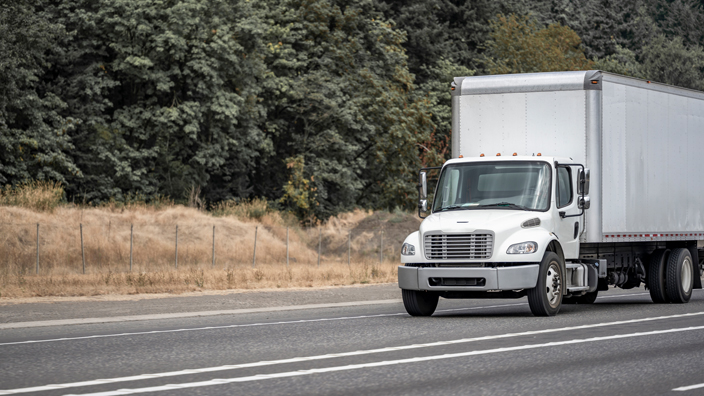
Do you know the guidelines on contracts?
Ethics rules apply both during and after USPS employment
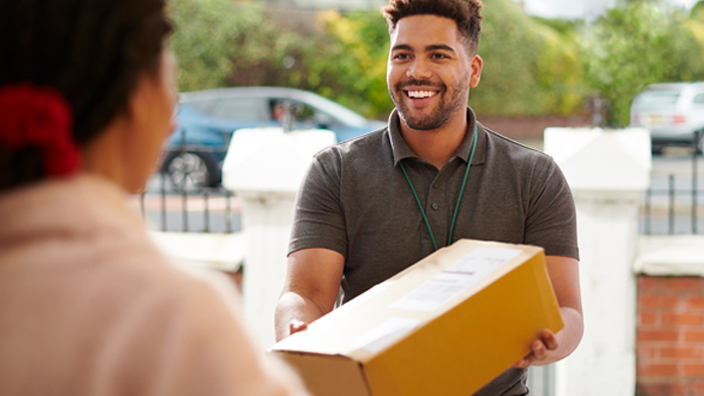
Do you have a conflict of interest?
Employees should follow the USPS ethics guidelines on outside activities
Footer items
- Off the Clock
- Week in Review
USPS National Employee Emergency Hotline:
888-363-7462
Weekly highlights
The Summer 2024 COVID-19 Surge Is Happening. Here Are The Top Symptoms You May Be Experiencing
"This is the million-dollar question."

Right now, pretty much all of the metrics the Centers for Disease Control and Prevention (CDC) uses to keep tabs on COVID-19 are through the roof—hospitalizations, emergency room visits, percentage of positive tests, and, unfortunately, deaths due to the virus. Fueling all of this are the FLiRT variants , including KP.3.1.1, KP.3, and LB.1.
People across the country are getting sick, raising a lot of questions about what’s happening now and, of course, what you can do to stay safe. Here’s what experts are saying.
Meet the expert : Thomas Russo, MD, is a professor and chief of infectious disease at the University at Buffalo in New York.
What is the most common COVID variant right now?
The most common COVID variant right now is KP.3.1.1, according to data from the CDC. It makes up nearly 28 percent of COVID-19 cases in the country. That’s followed by KP.3 and LB.1.
What is the most common COVID symptom right now?
Given that COVID-19 impacts everyone a little differently, it’s tough to narrow things down to just one symptom, says Thomas Russo, MD, professor and chief of infectious disease at the University at Buffalo in New York.
“However, for most people that are younger and not in the high risk category, it's really been respiratory tract symptoms,” he says.
What are the symptoms for the newer COVID variants?
COVID-19 symptoms have become pretty consistent. According to the CDC , those usually include:
- Fever or chills
- Shortness of breath or difficulty breathing
- Sore throat
- Congestion or runny nose
- New loss of taste or smell
- Muscle or body aches
- Nausea or vomiting
“Most people will have a sore throat, runny nose, a sense of fatigue, and not feeling like your usual self,” Russo says. “It’s not uncommon for people to have a day or two of fever and a flu-like syndrome.”
If you’ve never been vaccinated or managed to dodge COVID-19 so far, Russo says that you may have a “rockier course and feel miserable for a few days.” If you’re in a high-risk category, though, you may develop more severe symptoms.
Is there a summer COVID surge?
Yep, we’re in it. “There’s been a surge that’s been going on for a while,” Russo says. “Almost everyone you talk to has had COVID at this point.”
BinaxNOW COVID-19 Antigen Self Test

This isn’t just a U.S. thing: COVID-19 has been surging around the world, Maria Van Kerkhove, technical lead for COVID the World Health Organization, said in a briefing last week.
While over 20 percent of European COVID-19 tests come back positive, Van Kerhove pointed out that wastewater testing—which is even more reliable—shows that there may actually be two to 20 times more cases than that.
Is there a new vaccine?
There is a new COVID-19 vaccine, although it’s not here just yet. The updated COVID-19 vaccine is expected to be rolled out this fall, though there isn’t a hard launch date as of this second, Russo says.
What does that mean for you? “This is the million-dollar question I’ve been asked for the last month,” Russo says. “If you’re in the low-risk category or have recently been infected, you should wait to get vaccinated.”
But if you’re in a high-risk category , haven’t had the previous vaccine, and know you have some activities coming up that will put you at risk of getting infected (like going to an indoor family gathering or traveling for a work trip), Russo recommends getting the current vaccine.
If you’re not sure, of course, it’s not a bad idea to check in with your doctor to see where you land. Stay safe out there!
Novel Coronavirus

Violet Affleck Reveals Post-Viral Condition
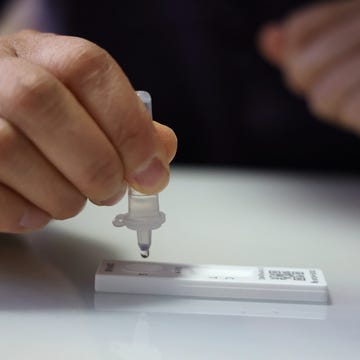
How Accurate Are At-Home COVID Tests?
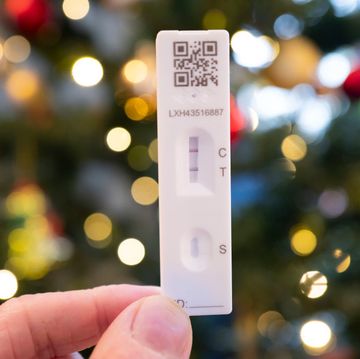
Here's What That Faint line On A COVID Test Means
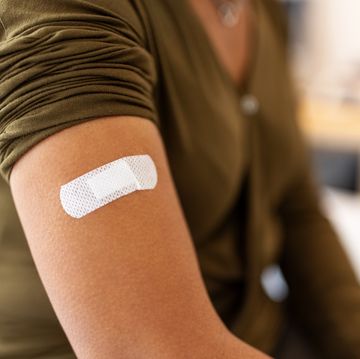
Which COVID Vaccine Should I Get?

How Long Do COVID-19 Symptoms Last?
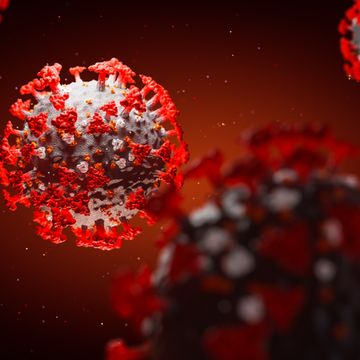
How Long Will I Test Positive For COVID?
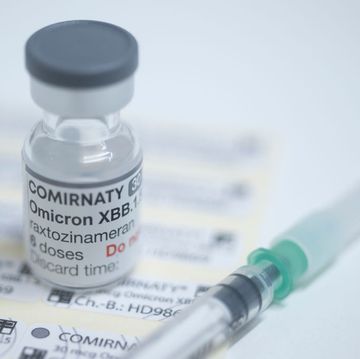
New COVID Variant Boosters Explained By Experts
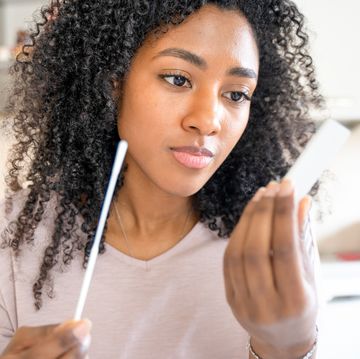
When Are You Most Contagious With COVID?
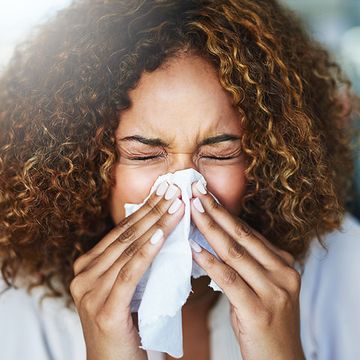
Will There Be A 'Tripledemic' In Fall 2023?
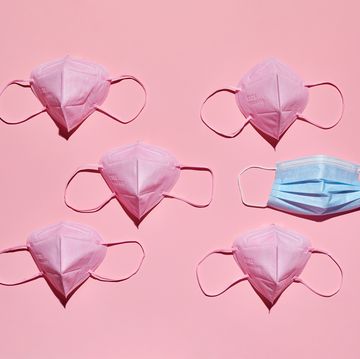
Will Covid Mask Mandates Return In 2023?

Best Disposable Face Masks To Buy On Amazon 2023

IMAGES
COMMENTS
Post-abroad depression symptoms. However, sometimes these post-travel blues can't just be attributed to reverse culture shock. Post-trip depression can feel similar to reverse culture shock, and it's possible many of your friends and family will tell you to "just get over it". But if you're experiencing any of the following signs ...
Share your travel experiences with your friends and loved ones. Sometimes voicing your emotions and talking it out can prove to be very cathartic. It works wonders for fighting the effects of post-travel depression and make you feel at ease. 5. Keep finding ways to grow.
Even if you're a couch potato, get up and start moving! Harvard Medical School reported that a recent study found that " Running for 15 minutes a day or walking for an hour reduces the risk of major depression." So, the third trick to beat post-travel depression is easy: get up and move. 4. Pay attention to your diet.
Post-vacation blues are real. Learn what causes these feelings and how to prevent and overcome them. ... Pack a travel journal . Memories fade — even the vivid ones. If you spend a few minutes ...
It's also known as post-travel depression (PTD), post-vacation blues, or post-holiday blues. Post-travel depression can also happen when someone returns from living abroad for an extended period. No one knows what exactly causes post-travel depression, but there are some plausible theories. Some say the large change in the environment causes it.
If depression symptoms persist or begin to feel unmanageable or severe, consider reaching out for professional support. The end of vacation mode is usually disappointing, but post-vacation ...
Ad Feedback. Whatever your vacation story, here are five tips from the experts to help you deal with a case of the post-vacation blues. 1. Plan a buffer for when you come back. We often overload ...
Post-vacation depression is common, a psychologist says. Here's how to beat the post-holiday blues. Dr. Daniel Glazer is a clinical psychologist. He says it's common for people to feel down after ...
What are post-travel blues? Post-vacation-syndrome - also called post-travel blues or post-holiday depression - is when one experiences feelings of depression and/or anxiety after a vacation. It can also manifest as irritability, listlessness, difficulty concentrating, and sleep issues, i.e., insomnia or sleeping too much.
Keep the buzz of excitement that comes with travel alive by maintaining the mindset of a traveler. Take a cooking class in your hometown, continue with surf lessons, take a dance class or two, and treat yourself to a nice meal every couple of weeks or so. Continue to 5 of 11 below. 05 of 11.
Focus on eating well, physical activity, rest, and other good self-care activities. Limit the stressors in your life. Though post-travel depression is no fun, remember that this condition is temporary—you have it in you to return to your normal life or make the necessary changes to help ease your sadness and stress.
5 Typical Post Travel Depression Symptoms. The symptoms of post-holiday depression can really include some or even all of the following: anxiety, fatigue, irritability, mood swings, headaches, sleeping too much or too little, change in appetite, weight loss or gain, inability to concentrate, increased desire to be alone, and loss of interest in things you usually enjoy.
Post-holiday blues: Symptoms: Tiredness, loss of appetite, anxious, nostalgia, depression, stress: Causes: Returning home or to a normal routine from a long vacation ... post-holiday blues (UK, Ireland and some Commonwealth countries) or post-travel depression (PTD) is a type of mood that persons returning home from a long trip (usually a ...
Though it sounds easy, it might bring a feeling of nostalgia. So, it is essential to keep a positive mindset and, therefore, make your memories a weapon against bad mood, depression, and stress. Let memories be your sunshine on a rainy day and your good news on a bad day. 4. Follow the Mindset of a Traveler.
Long-term travelers, such as expatriate workers, Peace Corps volunteers, or missionaries, have a greater risk of getting infected, sometimes without symptoms, during travel. If you are a long-term traveler, consider having a thorough medical exam or interview with your healthcare provider after you return to the United States.
In most cases, she says, illness after travel is due to a viral infection that usually resolves in 5 to 7 days. "For mild symptoms such as a runny nose, congestion or a sore throat, supportive care is sufficient," she says. "That includes acetaminophen or ibuprofen for pain relief, warm fluids and rest. However, in the case of more severe ...
Symptoms of Post-Travel Depression. The science around the post-travel blues is nebulous, but research subjects report feeling depressed after returning from travel in certain situations. Some research even concludes that post-travel depression symptoms worsen the more the subject enjoyed their trip. In many cases, the post-holiday blues appear ...
If you've just come back from holiday and you: pass loose or watery stools at least three times in a 24-hour period. have a crampy or sore tummy. feel sick. have a high temperature. vomit. then you may have traveller's diarrhoea. If you do have traveller's diarrhoea, try to stay hydrated and rest as much as possible.
It may feel like you can never get happy, don't enjoy your life anymore, or wish to end your life. If you are feeling suicidal, reach out to the National Suicide Prevention Lifeline today at 1-800-273-TALK (8255). They are available 24/7 to help. You're not alone, and your life is important. Depression is a mental health condition, so it ...
This post-vacation fatigue can also be known as leisure sickness, a psychological effect where those who do not take time to relax regularly often fall ill on vacations or weekends. Leisure sickness, though not recognized by all psychologists, has similar symptoms to the flu including body aches, headaches, and fatigue.
CDC Yellow Book 2024. As many as 43%-79% of travelers to low- and middle-income countries become ill with a travel-associated health problem. Although most of these illnesses are mild, some travelers become sick enough to seek care from a health care provider. Most posttravel infections become apparent soon after returning from abroad, but ...
Common symptoms of Covid include coughing, fever, sneezing, congestion, headaches, sore muscles, fatigue and gastrointestinal issues. Those who are asymptomatic but have been exposed to Covid may ...
There are several COVID variants right now which have the same "set of mutations," and are being referred to as FLiRT. Another strain, LB.1, is also on the rise. KP.3.1.1 — which comes from the ...
Mercury, the planet of the mind and the mouth, tech and travel, hot gossip and sexting, will spend the majority of this month retrograde, and four signs will feel the wrath of this backspin more th…
Symptoms typically start four to eight days after being bitten and last three to six days. There is no specific medicine available to cure it, and patients can only be given supportive treatment.
More than 200 long COVID symptoms such as brain fog, fatigue and post-exertional malaise (PEM) have been identified, according to the CDC. Symptoms can be difficult to recognize or diagnose, ...
Common symptoms of mpox are a skin rash or pus-filled lesions which can last two to four weeks. The rashes can be located anywhere on the body and some people may only have one, while others can ...
Mpox was declared a global health emergency on Wednesday for the second time in three years, as the World Health Organization urged action on a virus spreading rapidly through more than a dozen ...
The Postal Service is marking USPS Ethics Awareness Week by reminding employees to follow the rules on using the organization's property. Misusing postal property violates federal ethics rules and can result in discipline, fines, garnishment of wages and termination of employment.
The U.S. currently has a COVID-19 summer surge, thanks to FLiRT variants like KP.3.1.1. Here are top symptoms to look for, plus if you should get a new vaccine.